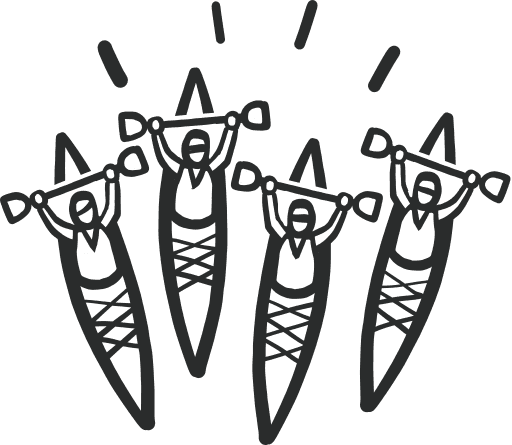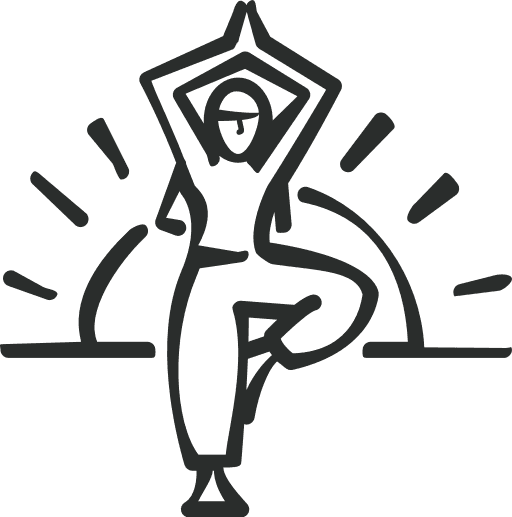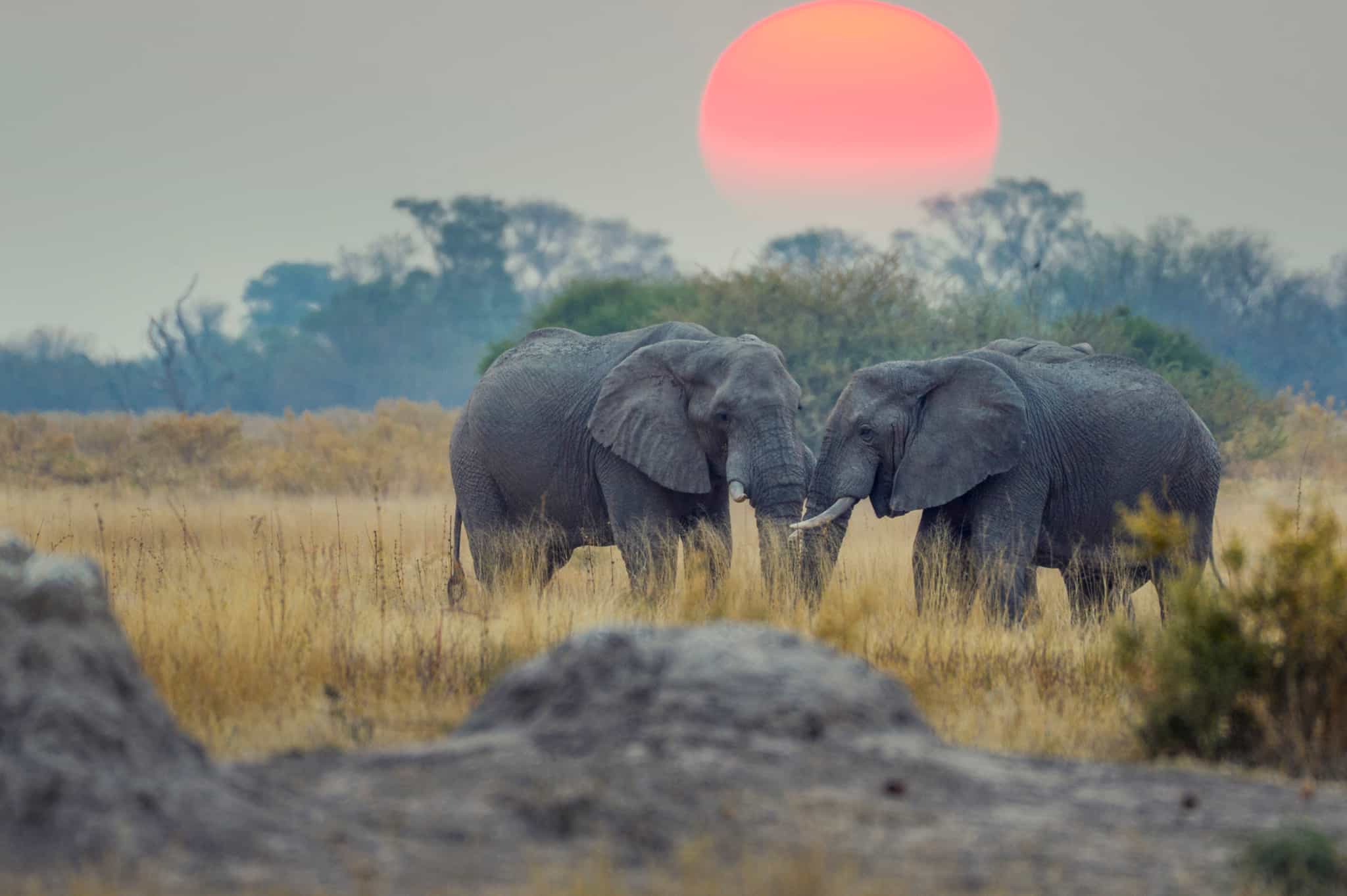
What's Included?
Activities & Certified Guides
All itinerary activities with a local, English-speaking guide; a mokoro poler, and specialist bushwalking and safari guidesAll accommodation
3 nights in a hotel or lodge, 4 nights at campgrounds and 2 nights at a private wilderness campMeals
9 breakfasts, 2 lunches, 5 dinnersTransfers & Equipment
All your airport transfers, local transfers, and tents are includedPermits
All Botswana national park fees are included. The fee for Victoria Falls National Park in Zimbabwe is payable on entrySmall Like-minded Groups
Solo-friendly by design, join our small n’ sociable groups of up to 12 like-minded, active and outdoorsy people…
…
What's it like?






























Journey by mokoro deep into the Okavango Delta for a magical stay at a wilderness safari camp set on an island – a total immersion in real, untamed Africa
Head out for bushwalks, game drives and boat trips with a specialist guide to spot elephants, lions, giraffes, cheetahs, hippos, rhinos and so much more
Cross the Kalahari Desert and the Kavango–Zambezi Transfrontier Conservation Area via Chobe National Park, to the thunderous Victoria Falls
Want to explore more of southern Africa? Our Desert to Delta Journey takes you through Namibia and across Botswana
Key Information
Day 1
Welcome to Maun
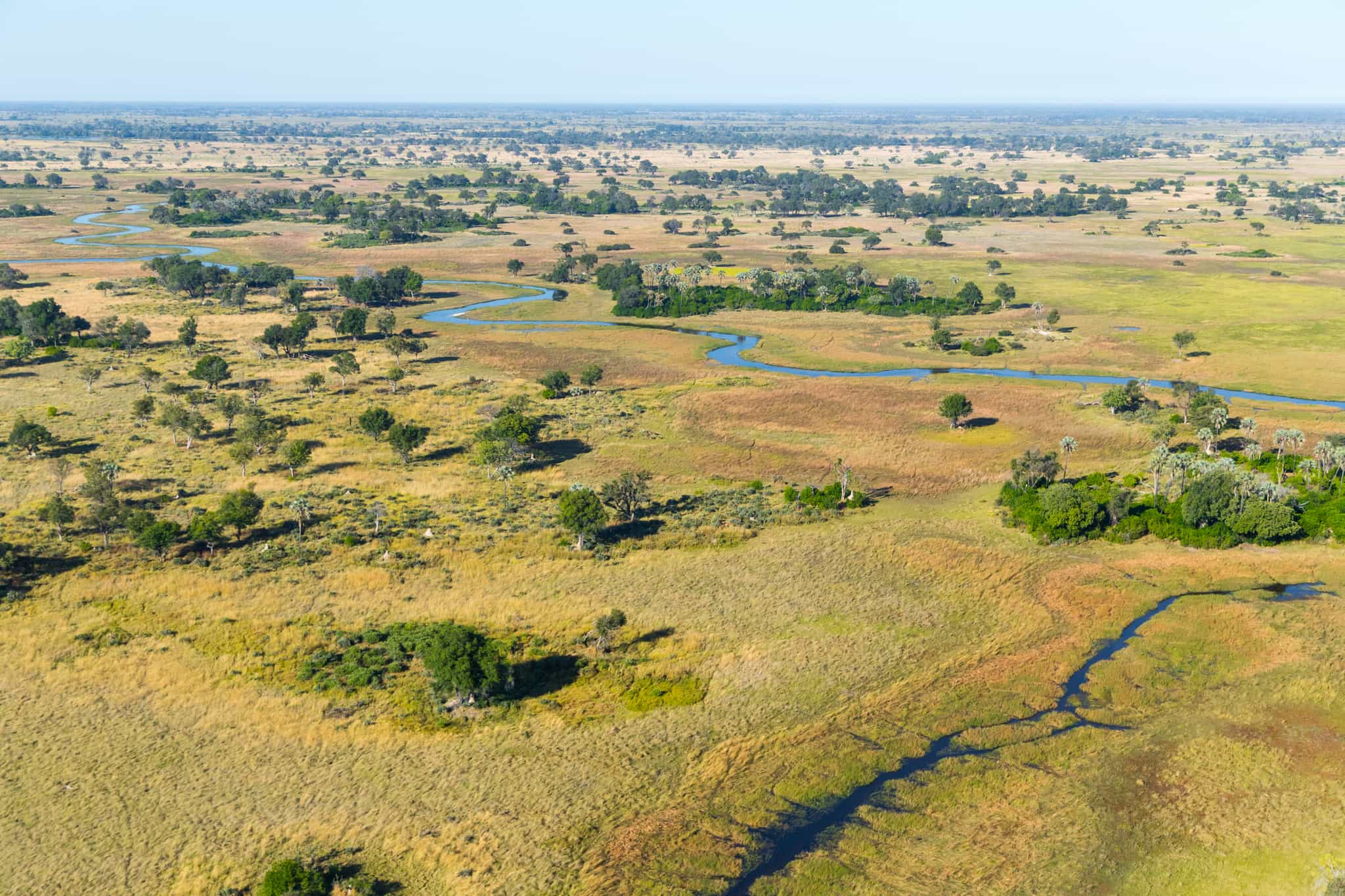
Descend over the vast plains of Botswana and touchdown in Maun, a bustling town on the banks of the Thamalakane River. Meet your host at the airport and transfer to your hotel. In the evening, you’ll get the chance to meet your guides and fellow adventurers and have a chat about the adventure to come.
Day 2
In to the Okavango Delta
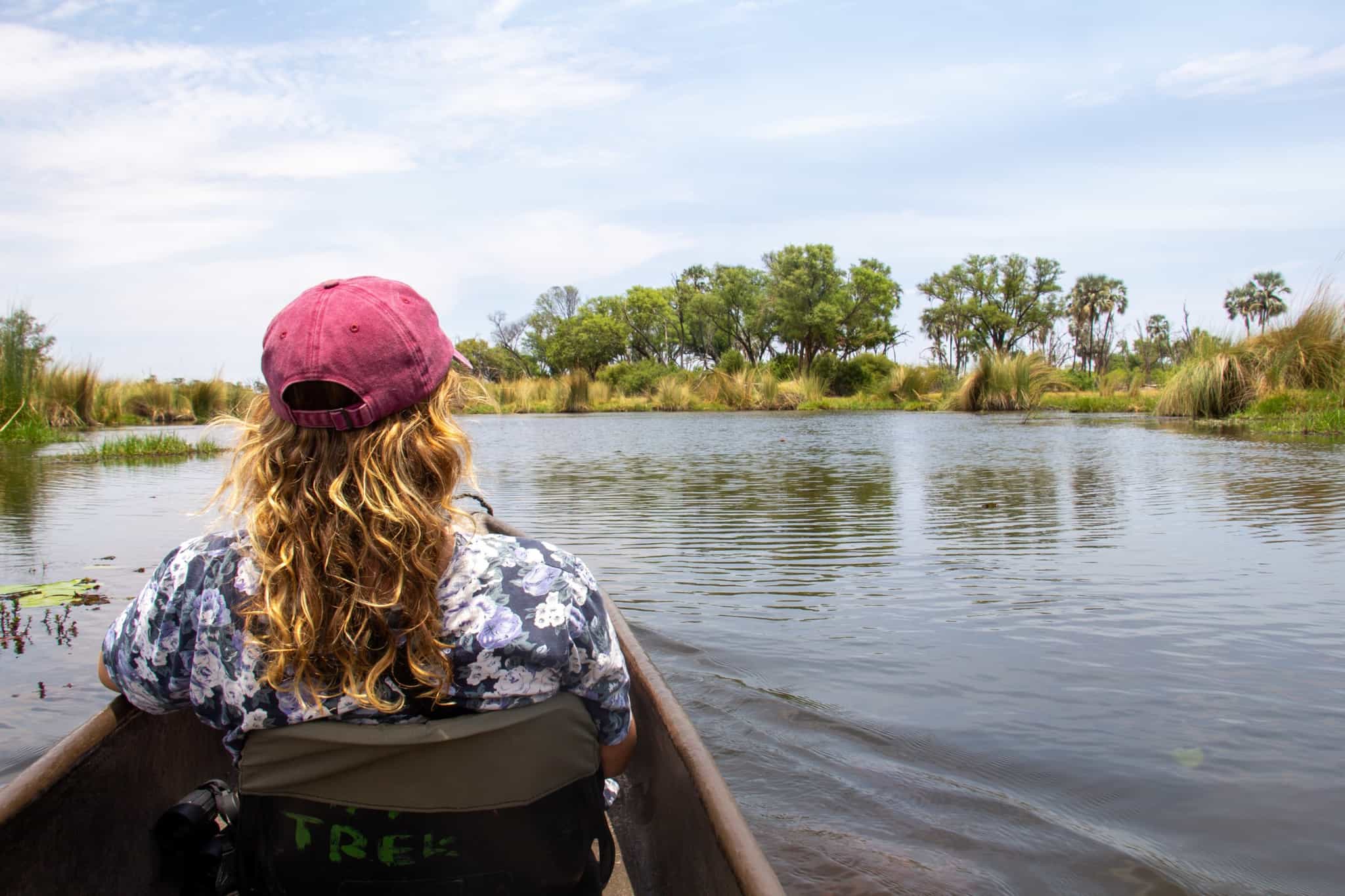
Driving
Mokoro Journey
Enjoy a leisurely start to the day in Maun to shake off any tiredness from the long journey to Botswana. This afternoon you'll head into the wild, driving out of Maun and turning onto a network of off-road sand tracks for a 4x4 journey deep into the magical wilderness of the Okavango Delta, with giraffe, elephant, zebra and buffalo for company. Arriving at the water's edge you'll meet your 'poler' – a local specialist guide from a village at the mouth of the delta. The polers are remarkable people with a deep knowledge of this incredible ecosystem. Your poler will guide you upstream serenely in a mokoro (traditional dugout canoe) for a few hours to reach a remote camp on the edge of Cha Cha Island. The mobile safari camp is already setup so you can relax and take in an iconic African sunset while watching the hippos in the water – eyes peeled for other wildlife as the light fades. Enjoy dinner and a campfire, hearing stories from your camp crew about their time working in wildest Africa. You'll fall asleep tonight to the sounds of the bush.
Day 3
Bushwalking in the Okavango Delta
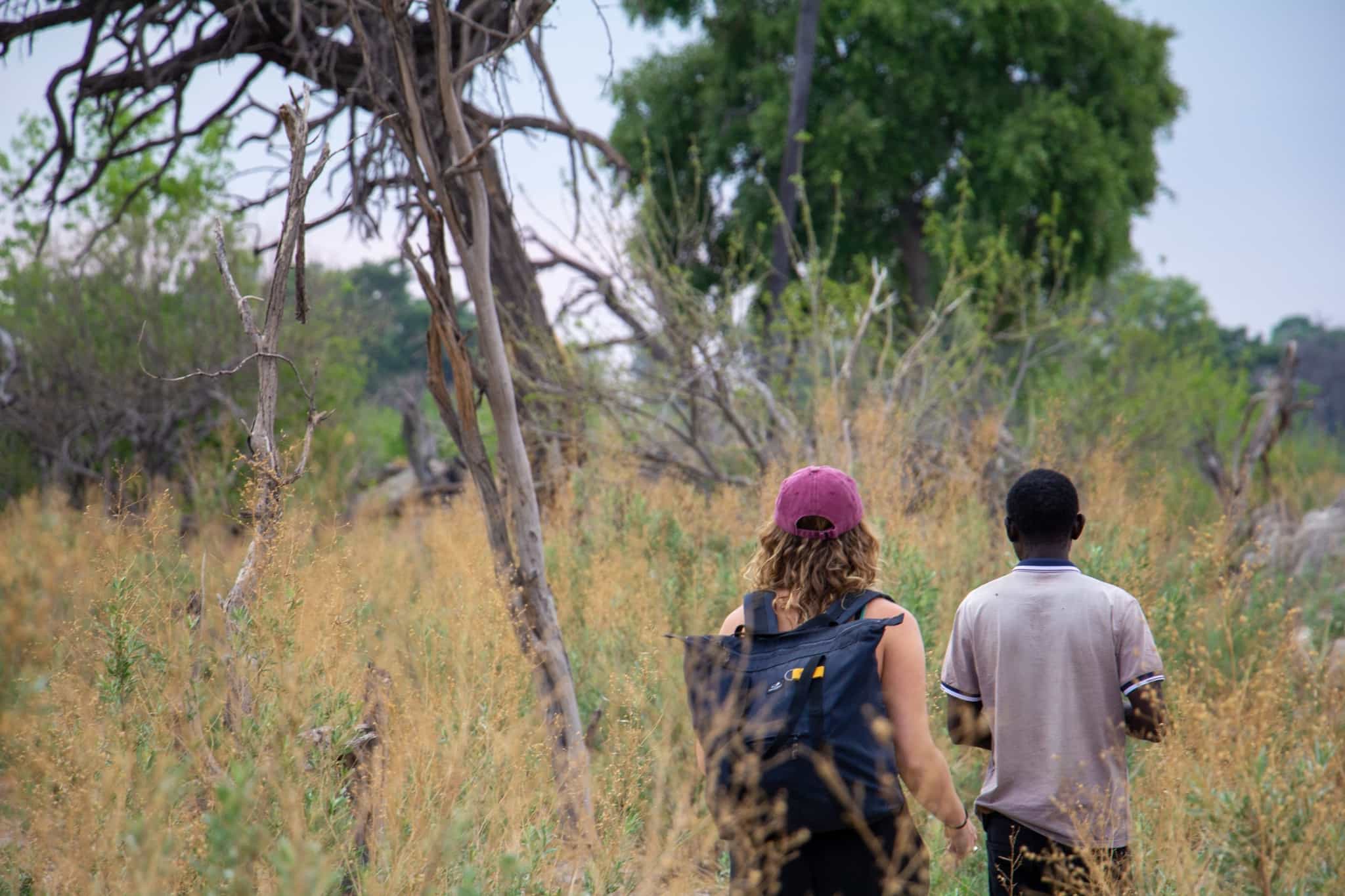
Bush Walking
Wildlife Tracking
Wild Swimming
Mokoro Journey
Wake up in the heart of the African bush, tucking into coffee and a light breakfast before hopping in the mokoro to cross quickly to the other side of the water. From here, set off on an extended bushwalk safari. Your guide will lead the way, talking you through the myriad intricacies of the African bush, telling stories about the wildlife and plant life as you track various species. You’ll likely see giraffes, zebras, antelopes, buffaloes, elephants, impala and countless bird species. Your guide will look out for tracks from the early morning activity for signs of big cats in the area – lion and leopard sightings occur regularly in this part of the Delta. Being immersed in the bush on foot is completely unique, so different from spotting animals on the classic game drive safaris. Eventually circling back to the water's edge, you can enjoy brunch and some downtime back at camp. In the afternoon you can hop in the mokoro to reach a good spot for an unforgettable swim (safely away from any hippos or crocs!). Later on, you’ll take another mokoro ride through the tranquil river channels, eyes peeled for wildlife emerging as the light fades. Watch a classic African sunset from the water before another magical evening around the campfire.
Day 4
Goodbye to the Delta
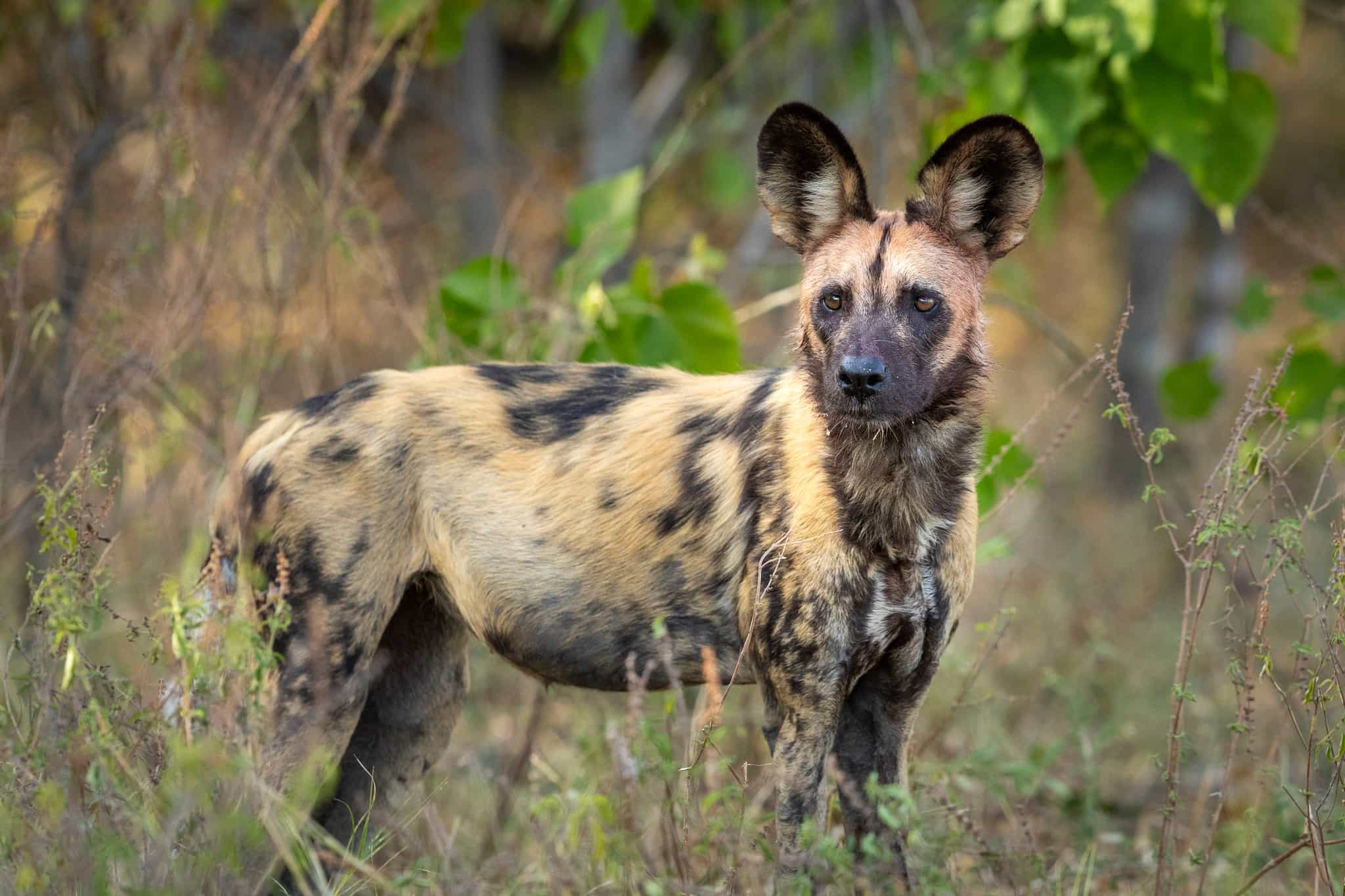
Bush Walking
Mokoro Journey
Rise early again – the African bush is at its most alive at dawn and dusk – to set off for another bushwalk, tracking various wildlife. Prides of lions have been spotted at this time of the morning on previous trips, as have African wild dogs – a rare and highly threatened species, though efforts to protect and conserve the population have been gaining traction in Botswana in recent years. Enjoy one last breakfast at the camp before you say goodbye to the wonderful staff who have looked after you while far from civilisation. Hop back in the mokoro for one final meander through the tranquil waters back to where it all began, with the 4x4 waiting to finish the journey back to Maun. Settle into your hotel and enjoy some creature comforts back in civilisation. The afternoon is yours to relax after your wilderness exploits the past few days – there are craft and artwork shops to visit and we highly recommend heading to an excellent restaurant called Marc's Eatery this evening.
Day 5
Nata and the Makgadikgadi Salt Pans
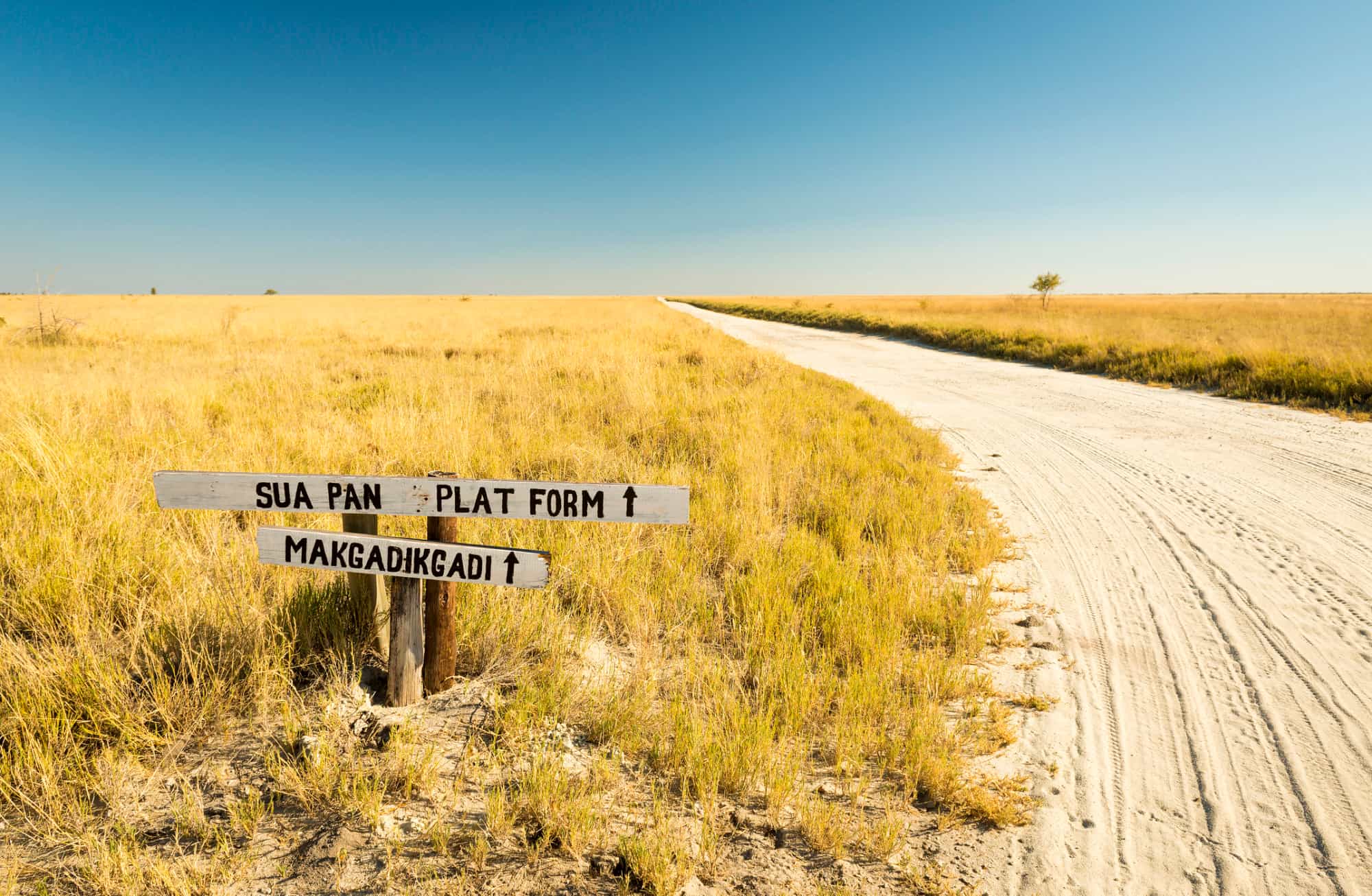
Driving
Hiking
Get back on the road first thing for a four-hour drive through the plains, heading east. You’ll stop to stretch your legs and grab some lunch before reaching Nata Lodge, a unique campground surrounded by an array of birdlife such as Meyer’s parrots and grey-headed bushshrikes. Take time to relax, or enjoy an optional visit to the nearby Makgadikgadi Salt Pans, the largest in the world. Finish the day with an evening sipping on sundowners or swimming in the palm shaded pool.
Day 6
Chobe National Park
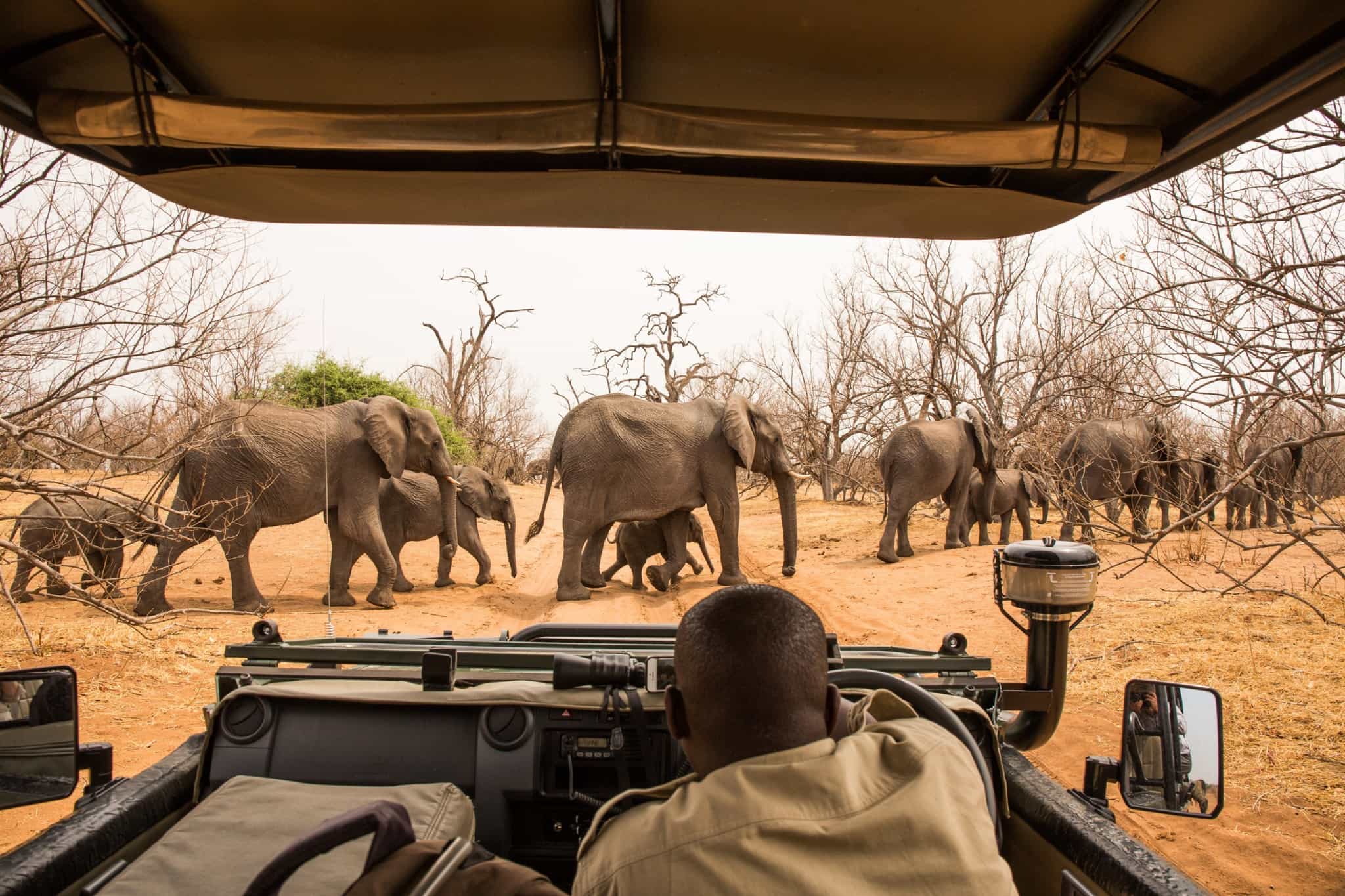
Driving
Wildlife Watching
Enjoy a leisurely breakfast at Nata Lodge before heading north on a five-hour drive towards the town of Kasane. Located on the banks of the Chobe River, it's found at the convergence of four countries' borders: Namibia, Botswana, Zambia and Zimbabwe. Kasane is the gateway to Chobe National Park – one of the world's great wildlife amphitheatres, particularly famous for huge concentrations of African elephants which gather on the banks of the Chobe River to drink. Head out on safari in the late afternoon to experience a classic game drive in a 4x4 with an expert tracker, who will know where to look for lions and herds of elephants. Sunsets on the Chobe River are particularly memorable, so grab a sundowner before dinner at the campground, situated on the banks of the river.
Day 7
Chobe National Park game drive and river cruise
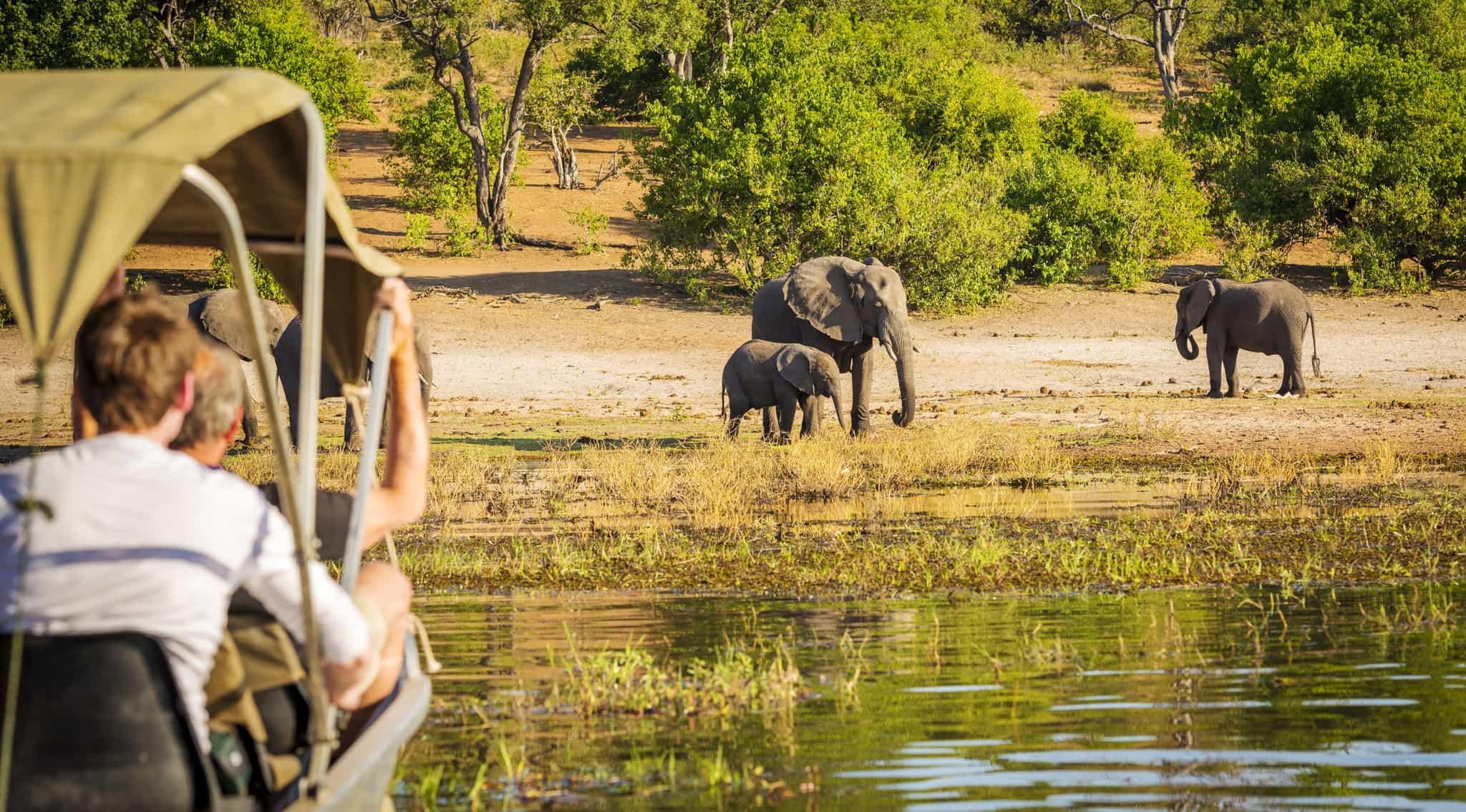
Wildlife Watching
Pre-dawn rises bring the best rewards in Africa, so start early again today with coffee in the dark before jumping on an open game drive vehicle. You'll be taken deeper into the Chobe National Park for three hours of wildlife spotting to rival anywhere on Earth. Afterwards, head back to camp for brunch prepared by your guide and enjoy some downtime. As the sun gets lower in the sky you'll head out again, this time on to the waters of the Chobe River for a sunset river cruise – you'll spot various animals congregating at the water's edge. A boat trip on the Chobe River is real once-in-a-lifetime stuff, with Namibia on one side and Botswana on the other, all the while surrounded by wildlife in every direction. The sun setting while on deck as you head back to the lodge in Kasane is yet another pinch-me moment on your journey across Botswana.
Day 8
On to Victoria Falls
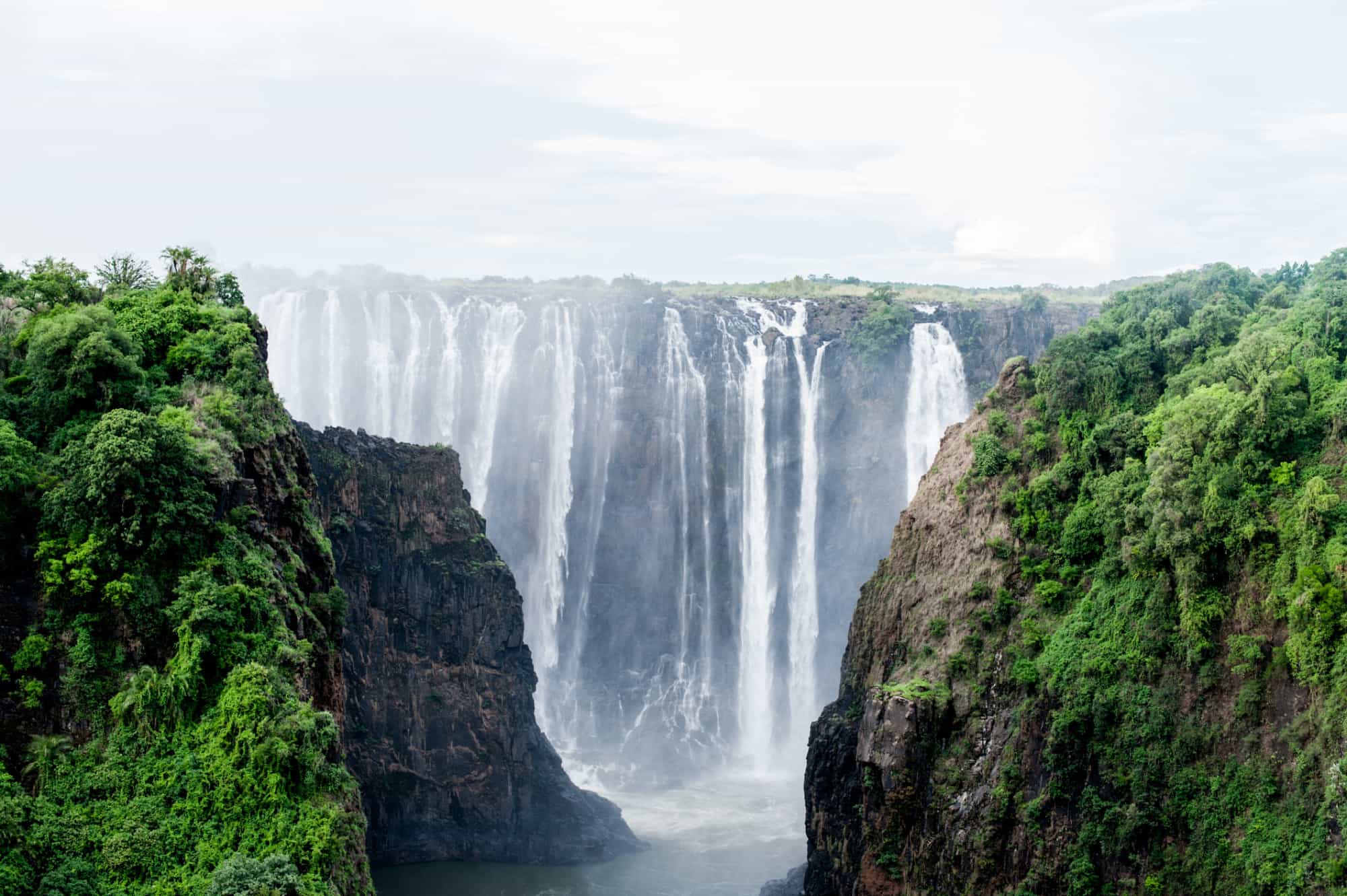
Driving
Hiking
Say goodbye to Chobe as you pack up and hit the road towards Zimbabwe. You’ll cross the border shortly outside Kasane, then drive on through the Zambezi National Park to reach Victoria Falls (please see the FAQs section for information about local payment for this border crossing). Check into your final hotel of the trip and peruse the many optional activities to consider. In the afternoon, you’ll head out to see the magnificent Victoria Falls, exploring the trails and massive viewpoints against the thunderous soundtrack. Why not celebrate with a final dinner at the hotel (or a local restaurant) to toast an epic adventure!
Day 9
Deep dive into the Falls
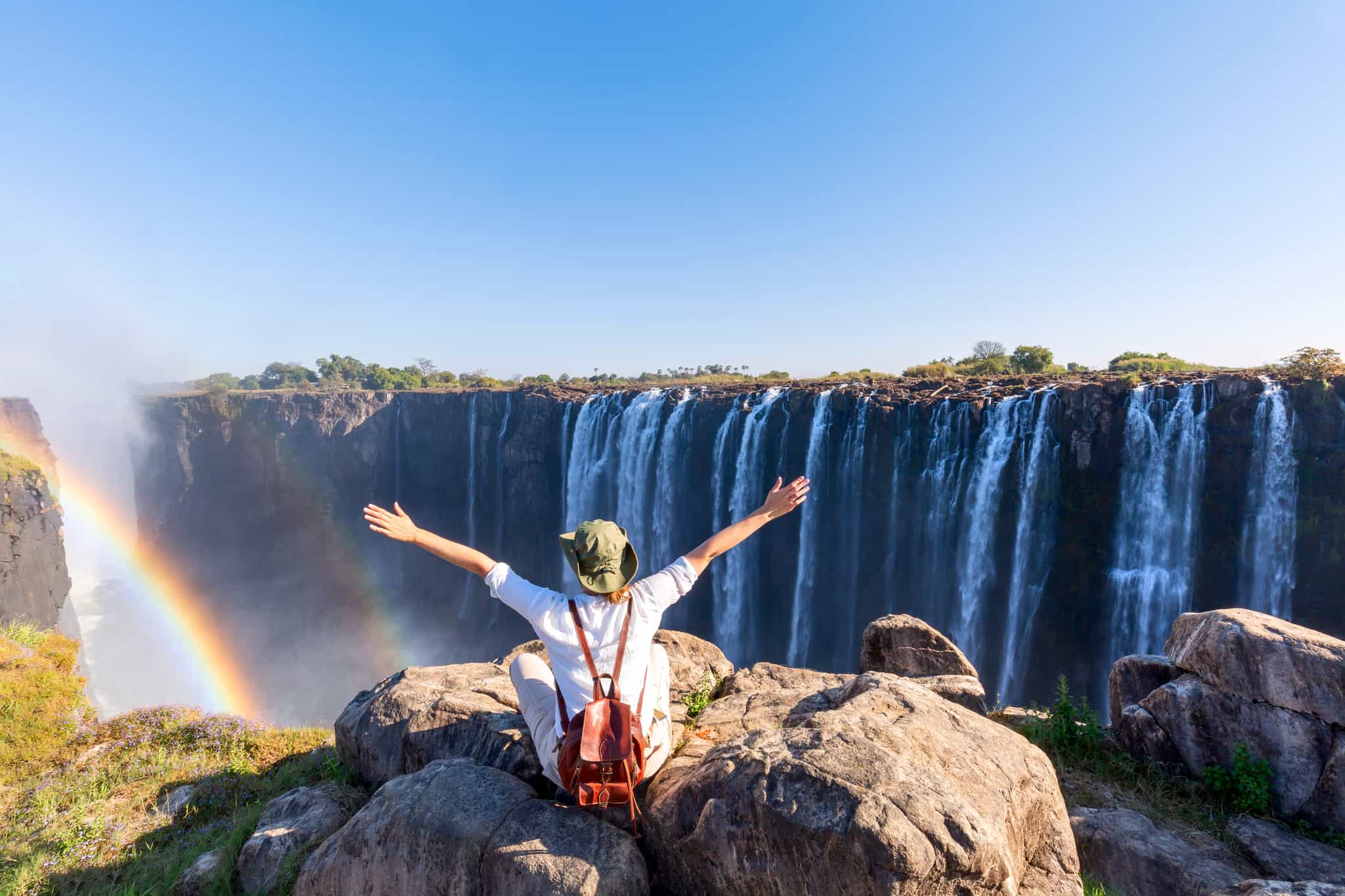
There are so many things to do at Victoria Falls, we've left this day free for you to head off for any one of the myriad activities offered by the lodge. There are options on the Zambezi River for a pure adrenaline hit after your wildlife adventuring, or you can get onto the river in more relaxed fashion with a sunrise or sunset cruise. If you've not had your fill of safari time – you can head out on a game drive or bush walk to add Zimbabwe to your safari-ing checklist. You can also simply ramble around the network of paths to different viewpoints of the Falls, at your own pace. All of these optional activities are payable locally, direct to your lodge.
Day 10
All good things must come to an end
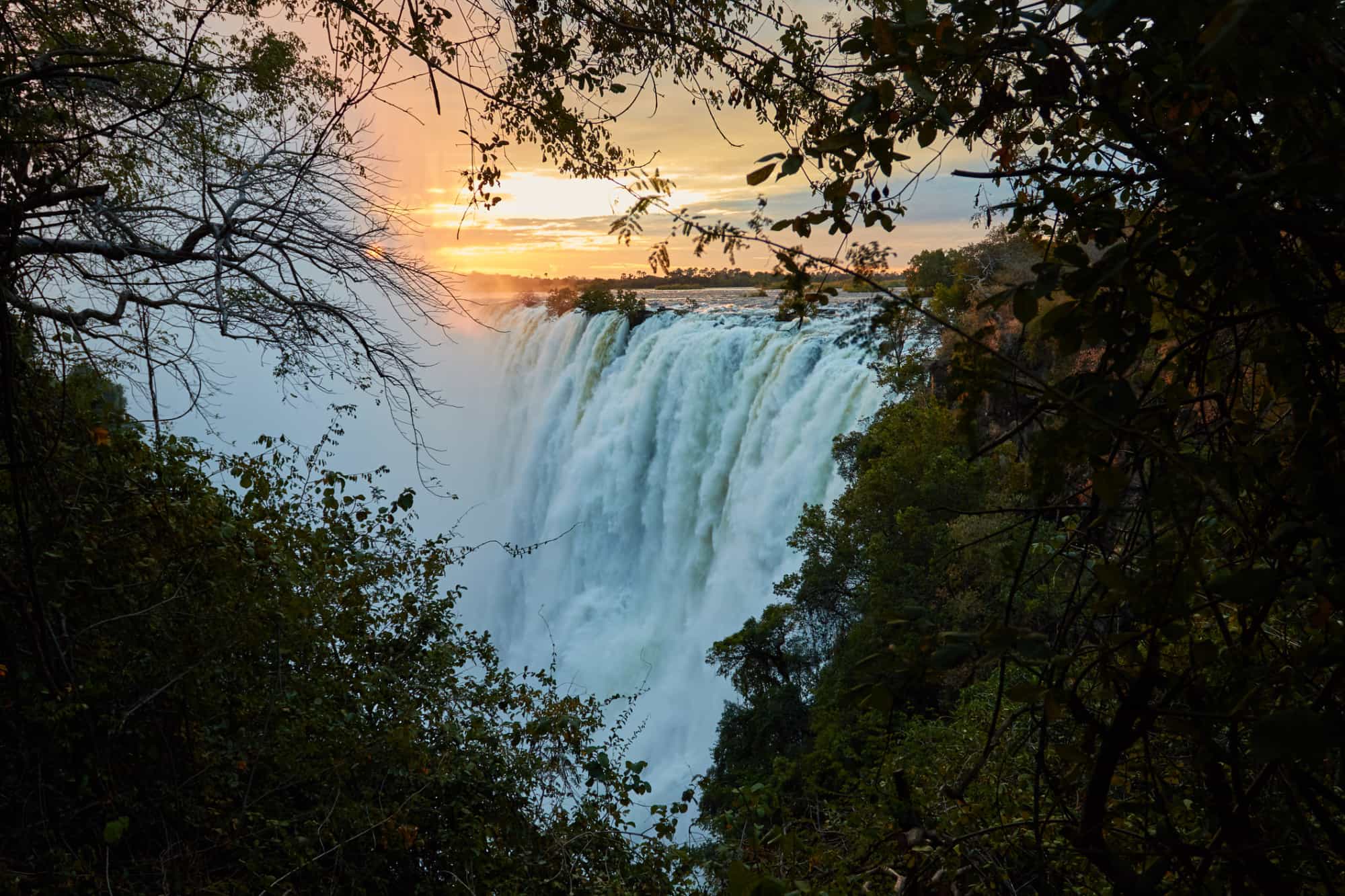
Today's the day your adventure comes to an end. If you are leaving the area, your host will transfer you to Victoria Falls Airport in time for your onward flight home. If you're staying on for longer, your guides and hotel staff will be able to arrange any of the myriad adventure options on offer here.
The Area
Logistics
Starts
Maun International Airport, Botswana (MUB)
Anytime on Day 1
Ends
Victoria Falls Airport, Zimbabwe (VFA)
11:00 on Day 10
Transfers
Arrival and departure airport transfers are included if you take the hotel shuttle transfer on Day 1 and group departure transfer on the morning of Day 10.
On Day 1, you will be picked up from Maun (MUB) airport by the hotel shuttle. Please ensure you enter your flight details in good time, so this can be booked for you at the correct time. Transfers from Maun (MUB) airport to the starting hotel take just 5 minutes. If required, private transfers to the accommodation in Maun can be booked for those arriving earlier for an additional cost, please see Optional Extras for more details. However, if you require more flexibility, taxis are easy, cheap and safe and can be taken from directly outside the airport.
On Day 10, there is an included group transfer to drop you at Victoria Falls (VFA) Airport, Zimbabwe at 11:00. If required, private transfers can be booked for those leaving at earlier or later times for an additional cost, please see Optional Extras for more details.
Travel options
Maun International Airport (MUB) in Botswana is accessible by flights which transit through Johannesburg in South Africa - the major hub for Southern Africa destinations. All major airports in Europe and North America have direct flights to one of the above transit hubs.
Returning from Victoria Falls Airport in Zimbabwe you can either fly back to Maun to pick up the return leg of your outbound route or there are direct flights to Johannesburg, Cape Town, Addis Ababa and Nairobi which will connect to major hubs in Europe, Asia and North America depending on your return route and carrier.
Day 1
Breakfast
Lunch
Dinner
Day 2 – Day 3
Breakfast
Lunch
Dinner
Day 4
Breakfast
Lunch
Dinner
Day 5 – Day 7
Breakfast
Lunch
Dinner
Day 8 – Day 9
Breakfast
Lunch
Dinner
Day 10
Breakfast
Lunch
Dinner
What is the food like?
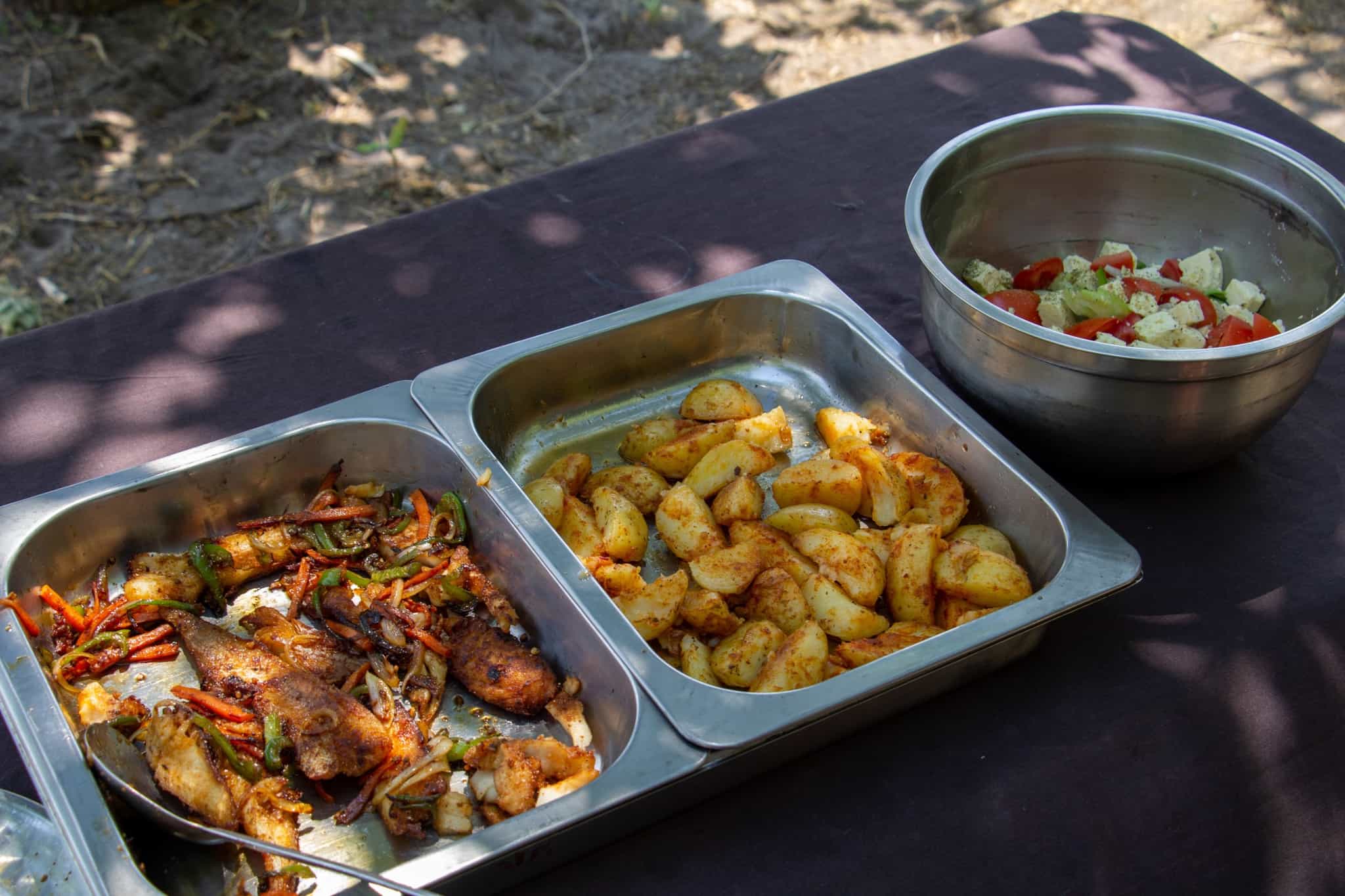
The meals in the Okavango Delta are a real highlight – there is a chef throughout the experience who whips up incredible feats given the remote location. Breakfasts are granola and yoghurt with fruit, South African-style rusks and even an English-style breakfast with sausages, eggs, beans and freshly baked bread over the fire. Lunch and dinner options vary, but expect breaded fish or a meat option with stir-fried vegetables, salads and potatoes. You may even be treated to fresh fish caught straight from the delta waters directly by camp. Vegetarians have options such as a homemade vegetable quiche. Breakfasts at the lodges, hotels and campgrounds will be continental style and usually consist of cereals, coffee, yoghurt, muesli, fresh fruit or the occasional cooked breakfast. Lunches in Maun, at Planet Baobab and in Chobe aren't included, allowing you to explore the local cafes and restaurants. Budget £7-10 for each lunch that isn't provided. All but four of your dinners are included; again, you are free to explore the local options, and should budget £10-15 for each of these dinners.
Vegetarians, vegans and other dietary requirements and allergies can be catered for – please just let your host know on booking. Note that vegan options are limited in Botswana, so if you're a strict vegan we suggested packing some of your favourite protein bars for extra fuel.
What is the accommodation like?
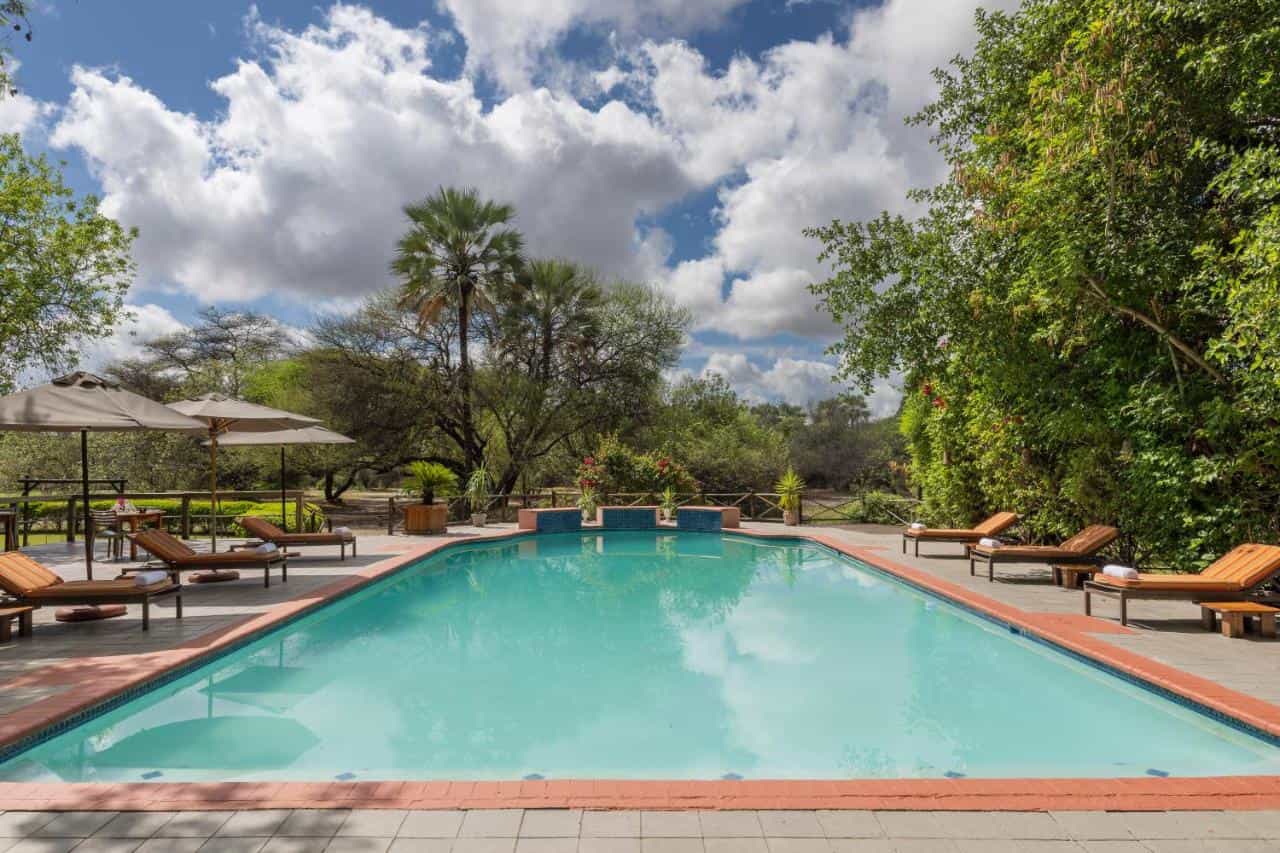
Maun, Botswana
On arrival in Maun, and again after your Okavango Delta wild camping experience, you'll stay at Sedia Riverside Hotel on the banks of the Thamalakane River in Maun. There is a restaurant, outdoor swimming pool, a bar and shared lounge. You'll stay in twin-share rooms with ensuite bathrooms. Please note that on some 2025 departures, the arrival hotel may be changed to Cresta Riley's Hotel or Maun Lodge. The night after the Okavango Delta section on all trips will be at Sedia Riverside Hotel.
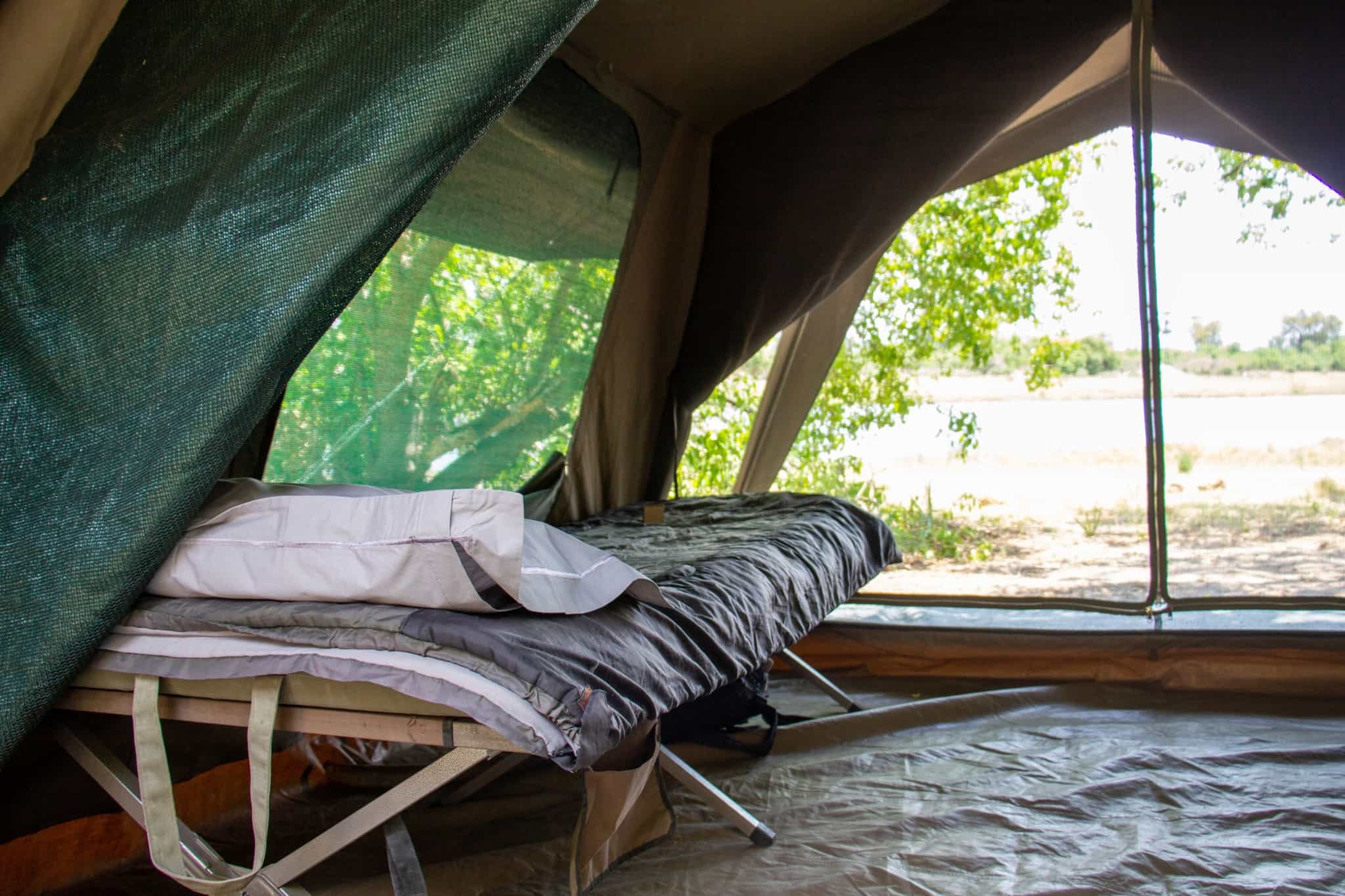
Okavango Delta, Botswana
Experience the Delta in the most immersive way imaginable – at a wilderness safari camp on an island, deep amongst the waterways. Here you can sleep beneath the stars, listen to the sounds of the African bush and spot wildlife on the banks right from your camp. Akin to a mobile safari camp, your host will set up ahead of your group's arrival, utilising a network of porters who transport the tents, common area, solar lights, camp showers, cooking gear and all food and drink via mokoro canoes, for this three-day/two-night experience. The camp is private – you won't be sharing with other groups or travellers – and the sense of being remote and far-removed from civilisation is tangible throughout. You'll stay in twin-share safari-style tents with comfortable raised camping beds, sleeping bags and fresh towels. There are camp showers and hand basins for you to wash in. The group eats breakfast, lunch and dinner together with the mokoro guides under a large common area under canvas, with tables and chairs to relax in.
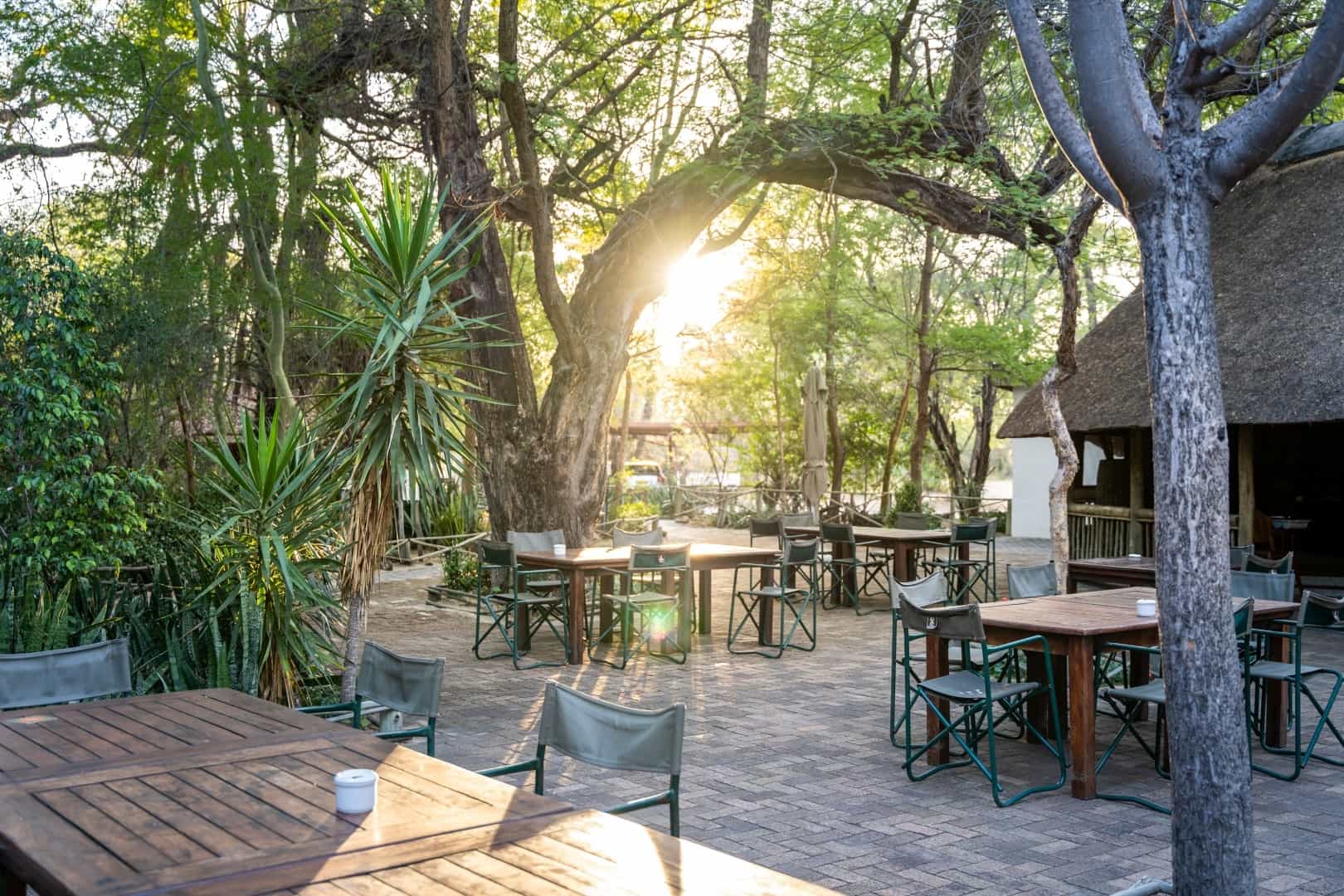
Nata Lodge, Botswana
En route to Chobe National Park, you'll overnight in an incredible spot: Nata Lodge. It's set within the lunar landscape of the Makgadikgadi Salt Pans, an area the size of Switzerland which is also known as the Baobab capital of the world. You'll stay in a lovely shady campground, with a great swimming pool, in twin-share tents with shared bathroom facilities.
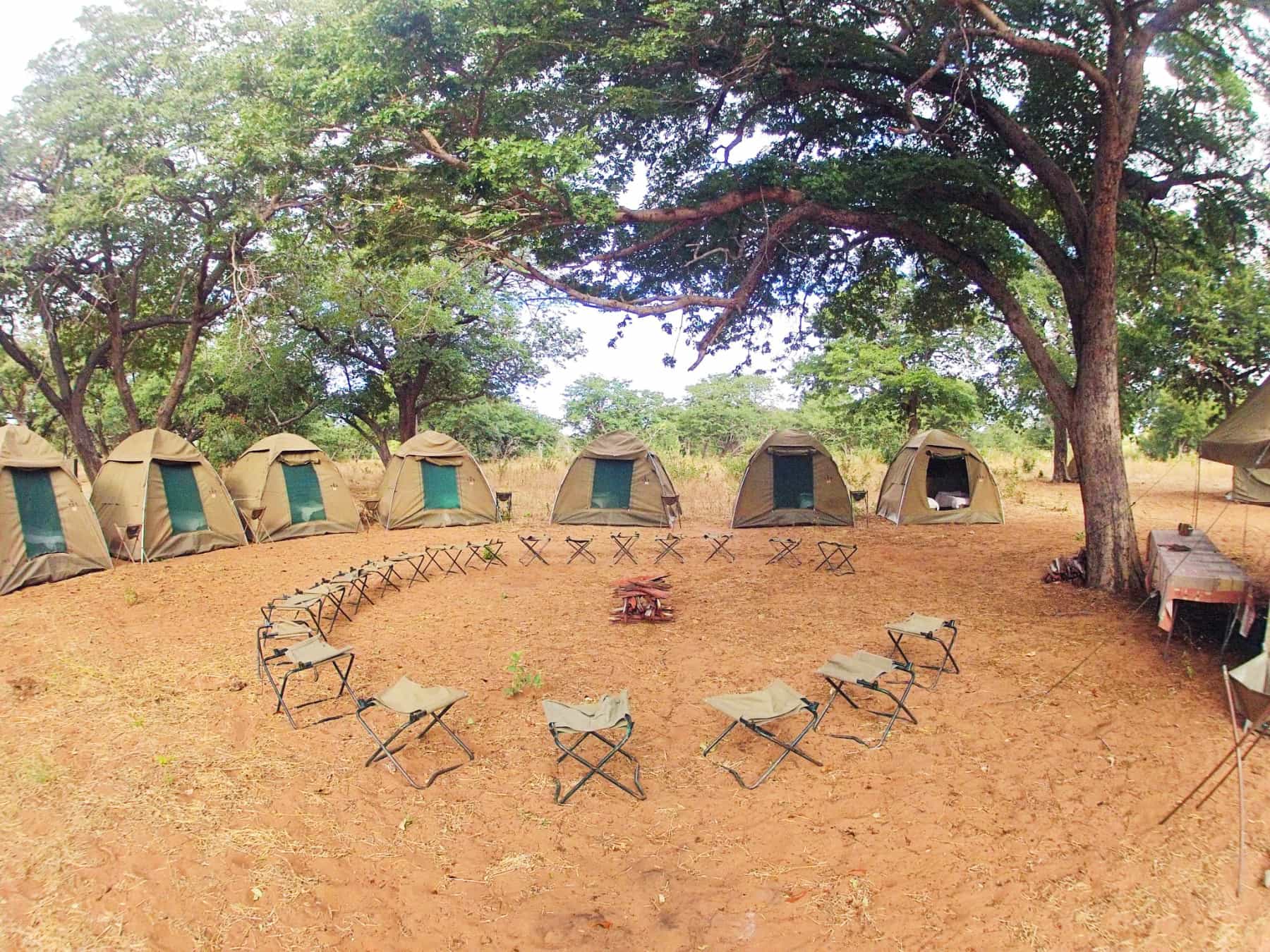
Chobe National Park, Botswana
Thebe River Safaris is your base and launchpad to explore Chobe National Park. You'll stay in twin-share tents in arranged as a private setup for your group, with a barbecue area where your guide will cook dinner. There is an outdoor pool, gardens to relax in whenever you're not on safari, and a restaurant serving a variety of food.
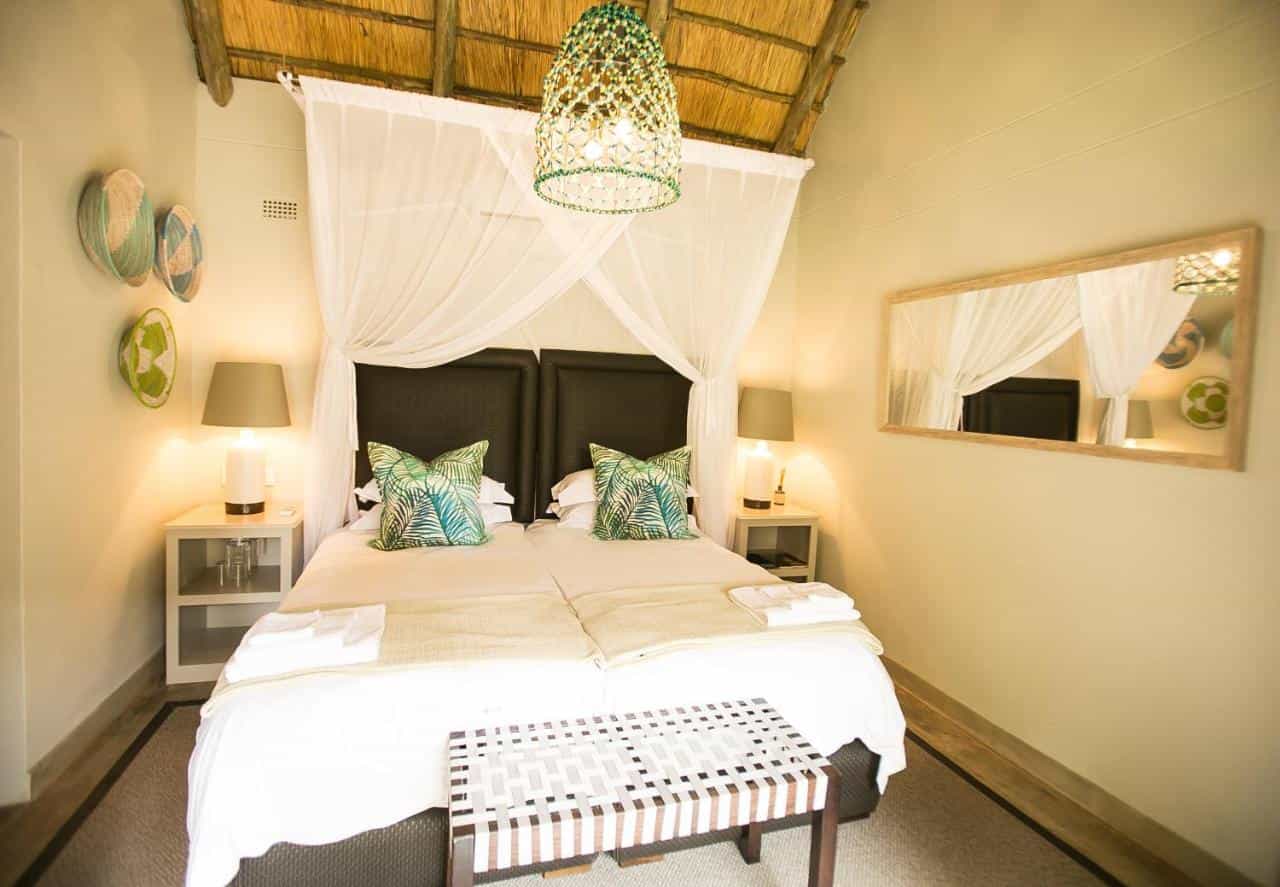
Victoria Falls, Zimbabwe
Your final two nights of the trip are at Victoria Falls in Zimbabwe. You'll stay either at Shearwater Explorers Village or Rainbow Hotel - both excellent bases to explore the falls and a jumping off point for any activities you are aiming to do there. Both are a short distance from the falls, with their own restaurant, outdoor swimming pool, bar and a shared lounge. You'll stay in twin-share rooms with ensuite bathrooms.
Upgrades
For solo travellers looking for their own space, an optional private room and tent can be booked for an extra charge, see Optional Extras for the price. Please request this at the time of booking (this is subject to availability).
This trip has been rated as Easy
This is an overland adventure, manageable by anyone with basic fitness levels. The bushwalking and the mokoro canoe trips in the Okavango Delta are the most strenuous activities, lasting several hours at a time, but with plenty of stops to observe the wildlife. Camping in the Delta is very basic, but the rest of the trip is a classic African overland experience, with facilities, light walks and a few hours hiking around Victoria Falls. In Chobe National Park you can kick back, rest your legs and enjoy the game drives and river safaris.
What will I need to carry?
You'll need to have a larger bag suitable for all your belongings which will be transported for you, and then a small daysack to carry personal items during each day of hiking.
Botswana can be visited year round, with some seasonal variations. The dry season runs between May and October during which you'll get warm, sunny days with temperatures ranging from 22-35°C (72-95°F) and chilly nights. The time of year when the water levels in the Okavango Delta are at their highest is typically several months after the rains have finished (due to the slow water movement across the delta region), and changes each year depending on the climate.
The green season runs from November to April, with generally slightly lower temperatures and the odd shower, giving the scenery an extra pop of verdant foliage.
Botswana is incredible
Botswana is a uniquely special place to see wild life and this trip delivered on that, especially the wild camping in Okavango Delta. Chobe Park and Victoria Falls were also super impressive so it was a well rounded trip, albeit with a bit too much camping for me personally.




Unforgettable!
This trip lived up to expectations and so much more!
The wild camping in the Okavango Delta made ever lasting memories! Turning out of our camp for our afternoon mokoro ride to a site of a heard of elephants in front of us, a pod of hippos to our left and giraffes and water buffalo just behind them! The Polers did a great job looking after us and had exceptional knowledge of there surroundings and the wildlife in the delta.
Highly recommend going to the salt pans on your way to Kasane and enjoy sundowners whilst you watch the flamingos.
Then on to Chobe and the locals say Chobe “never disappoints” and they were absolutely spot on. The guides were experts in tracking the animals and we were lucky enough to see 4 of the big 5 except the rhinos.
The trip was topped off by a beautiful two days by the falls and if you go when the water levels are high expect to get drenched! But this still didn’t stop the smile on our faces and we all soon dried out.
The food throughout was delicious the poler’s, Happy and Micheal served up a treat every night whilst we was camping. And if you are eating out in Victoria falls I recommend Baines restaurant right next to the Zambezi river. The locals were all friendly and couldn’t do enough to help.
10/10, didn’t want it to end.



Incredible trip!
The trip was amazing and exceeded all expectations. I can't believe how much wildlife we saw, and the number of Elephants in the Delta was really nice to see. Mike the main guide was excellent, really knowledgeable, very interesting to talk to and a really nice guy. Dips our main guide in the Delta from the local village was also really good. His tracking skills led us to all sorts of animals on the bush walk. Walking amongst the animals is really special.
Camping in the Delta was the real highlight. All the guides and camp assistants were from the local village which is nice. The food was incredible and you are well looked after. Going to sleep at night listening to the Hippos, Lions, Hyena and Elephants is something I really miss.
I read the reviews about animals coming near camp and we had just that. Three of us were sat on the edge of camp watching where we often saw Elephant pass. We watched as four Kudu passed. Then we had a female Lion walk right passed us just over 100m away stalking the Kudu. Amazing feeling to know you are in the wild with them with nothing between you.
Chobe National Park is also really good. We were fortunate to see a Leopard and a pride of female Lions.
Ending in Victoria Falls was the perfect end to the trip.
Only issue we had was arriving in Botswana. We weren't given the name of the hotel in advance, we just had the possible ones from the website. This created issues at Passport control as we had to name the hotel we were staying at on our entry form. The WiFi in the airport hardly worked so we couldn't contact anyone and were initially refused entry. Make sure you get the name of the hotel before you fly.
Thanks for taking the time to review your recent trip to Botswana. We are delighted to read (and see from your photos!) that you had such a wonderful trip with some incredible wildlife experiences.
We are very sorry that you experienced some issues on arrival. We have identified that our usual detailed pre-departure message was not sent to you on this occasion which we would like to apologise for. On the back of this feedback, we have put some extra checks in place to make sure that all travellers receive the same detailed information prior to arrival in country. We trust that this will ensure any future travellers do not experience the issues that you did.
Once again, thanks for your valuable feedback and we do hope to be able to welcome you on another MBA trip in the near future.
Ruth MBA Operations Team





Wild Botswana
This trip was a genuinely wild experience, much better than any 'tourist' experience. Our guide Mike was fantastic and the trip included all the things to make the best out of the time there. There's a good mix of camping and hotels. Such an authentic and genuine experience.
A great trip with an
A great trip with an engaging guide and a good group!




Incredible wildlife & people
I absolutely loved this trip. The time in the Okavango delta was incredible - it felt very special to spend time with local people and to experience a really wide variety of wildlife on foot and by Mokoru. The local guides (especially Otis) were really knowledgeable and friendly, the food was delicious and the tents very comfortable. I only wish we could have stayed longer. Chobe was also incredibly and we saw so much wildlife. The ratio of travel time to activity time is quite high and there were a few differences to the itinerary (eg. The hikes mentioned didn't really happen and we couldn't stay at Planet Baobab as there had been a fire) but the main guide and group were very friendly and everyone got on really well. If you stay at Nata lodge and get a chance to visit the salt pans do it - it was a highlight!



Unique and wonderful experience
This was a very authentic experience and we saw a diverse amount of wildlife whilst we were there. The guide Mike was amazing and the local people taught us so much! Get booking! It’s a once in a life time experience!



A Truly Magical Experience
My first MBA trip went far beyond my original expectations. Each campsite was wonderful, every brief hotel stay came at exactly the right time to refresh/recharge for the next leg of the journey, and the experiences and tours were top-notch. I particularly enjoyed walking around the Kalahari with people from the San tribe and the stay in the Delta, where the hippos are so close the entire time. If you are looking to get up close to the wildlife and snag some good photos while also being immersed culturally in where you are staying, this is a great journey.
First time traveling with MBA
Had a fantastic time, it was a truly wonderful trip and I always felt safe and looked after.




Africa at its wildest
If you want to experience Africa at its wildest then this is the trip for you. I’ve previously camped through Tanzania, Kenya, Uganda, Rwanda and SA, and nothing came close to the Okavango.
There’s a lot of travel, early starts and some basic camps but you will be well looked after by brilliant guides and treated with some amazing food along the way.
Be prepared for few ‘moments’. We camped amongst a huge pod of hippos and also encountered lions, crocs and elephant up close and personal (even in the camp). But these are memories I will never forget!
Our group ranged from 30’s to 60’s, 7 ladies and 2 guys, and nobody found the trip too strenuous. The longest walk was a slow bush walk for 4 hours and plenty of stops, albeit with a hot sun towards the end.
The biggest problem with this trip? Sorting through the huge stack of photos you’ll have at the end!
If you want a taste of real Africa and you’re happy to put your trust in brilliant and experienced guides then don’t hesitate - this is the trip you’re looking for!
(Final tip: If you’re travelling in winter, pack warm! We had sub zero nights and were all pretty chilly, so do come prepared.)
A fabulous trip with the
A fabulous trip with the best guides, excellent food and amazing views and wildlife. Thank you so much for a holiday of a lifetime
Fab holiday
Thank you for an amazing trip. Mike and MC were fabulous hosts and the vegetarian cooking did not seem to phase MC at all. Rhino was comfortable and well equipped. Probably the standard out moment was the wild camping in the delta next to the laughing hippos but seeing a leopard was also amazing. Thank you. Would definitely use MBA again.






Loved every second !
Loved every second of it! Felt like such an adventure, sleeping in the wilderness, connecting with local people, seeing so many animals and delicious food throughout! Mike our guide was just amazing and the group got on so well. Okavango delta was a highlight, the wild camping was one of the best experiences ever. Would go back in a heartbeat!










Adventure of a lifetime, just book it!
Book this trip......don't think about it, just do it! A once in a lifetime experience! If you're thinking about Africa, look no further! This trip is everything you thought it would be and more ! The tents are fantastic, spacious, and easy to put up. The safari truck is the best way to explore on your journey, and we loved "the Rhino " truck. The small group sizes are the only way to experience, and enjoy this safari adventure. Roll down the windows, feel the breeze, and watch as wildlife stroll past. Savour the moment as elephants drink, and play in mudpools on the side of the road, in the heat of the day. So many photo opportunities, and an incredible experience. From, game drives, nature walks, river cruise, and culture, this tour has it all, and leaves you wanting more! It's that enjoyable, I'd do it again! One of the many highlights was the bush camp. The staff and local guides make your stay that much more, and the food was so tasty especially the vegetarian dishes, and I'm not a vegetarian🤣 Idyllic camp sites located in the Okavango Delta. This was one of the most memorable moments on our journey, a get away from it all. I couldn't take my eyes off the hippos, elephants, and othe wildlife, I was hypnotised by every moment. I especially loved the safari walk into camp after the drive, the Mokoros gliding out of camp, and the staff who make you feel so welcome. I'd go back in a heartbeat! Mike our guide organised an open door helicopter flight in Maun over the Okovangodelta for us, and it did not disappoint! We witnessed a once in a lifetime opportunity of a wild dog hunt. We watched 19 wilddogs take down a Lechwe, a National Geographic moment! One we will never forget, and such a rare opportunity to witness. This trip is one of the best tours I have been on. I loved the Namibia tour we did last year with Much Better Adventures, and this also did not disappoint. I'm hooked! If there is one thing you do, it's book this trip! Great camp sites, comfortable hotels, and endless opportunities to see a range of wildlife, a journey you will never forget. No wonder Botswana is one of the most popular safari destinations. Finish your tour at Victoria Falls. I'd highly recommend staying an extra night and walk over to the Zambia side of Victoria Falls. Well worth the views, and a a great way to finish your adventure of a lifetime! It's not a holiday it's and adventure!
Great trip with great guide !
This is a great trip despite the longish drives, which get broken up as there's so much to see. Overall the itineary is good but as the wild life in Chobe is so varied and plentyful I would have liked another day there.
The camp site in the Okawanga was set up and very good. The team looking after us were amazing and the food some of the best we had on the trip
I would still highly recommend this trip.
Great bones but room for optimizations
Great bonus but room for improvement. The highlights were amazing but wish we had more time in Maun and wasted less time where there was nothing to do or see.
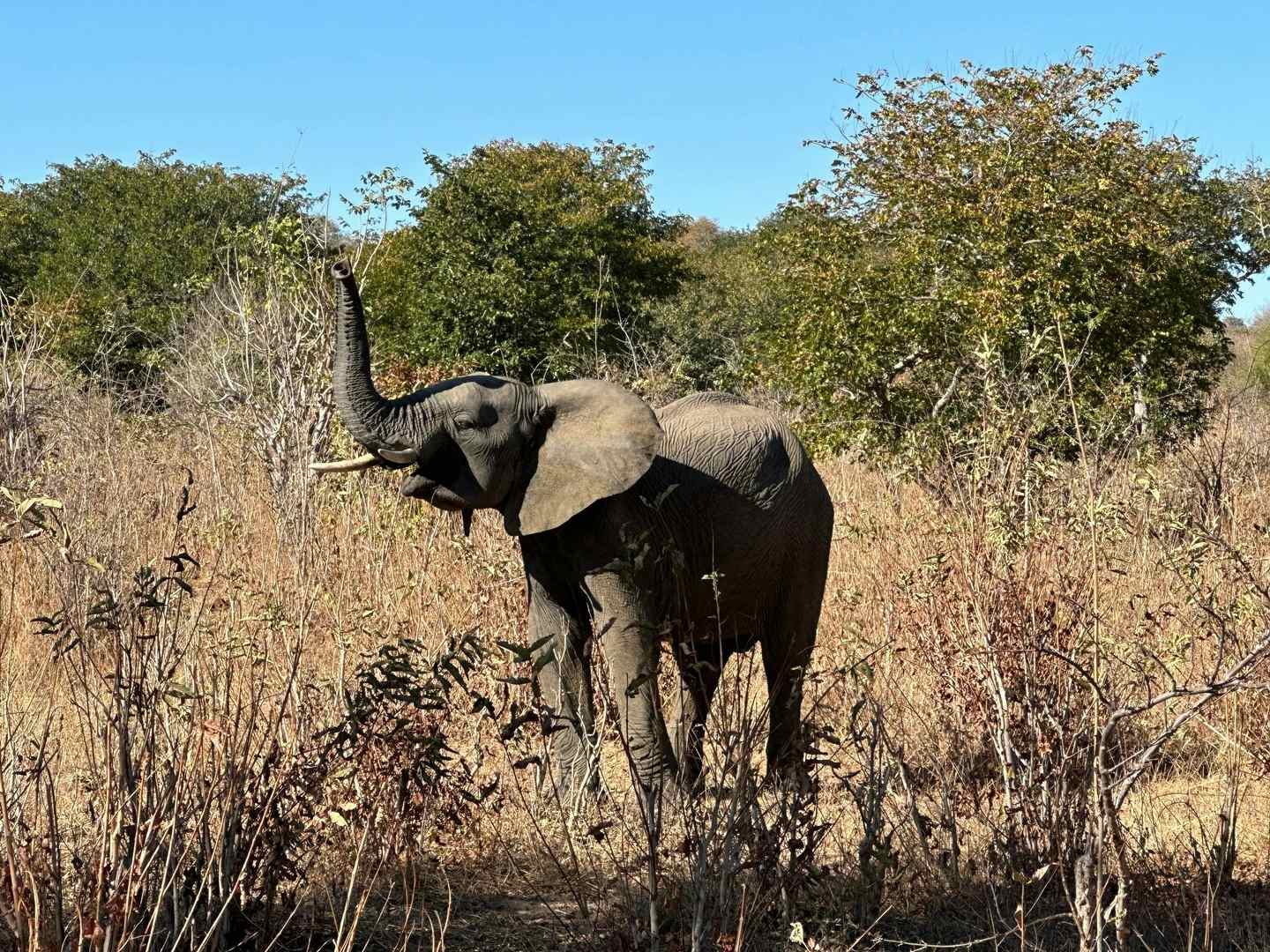
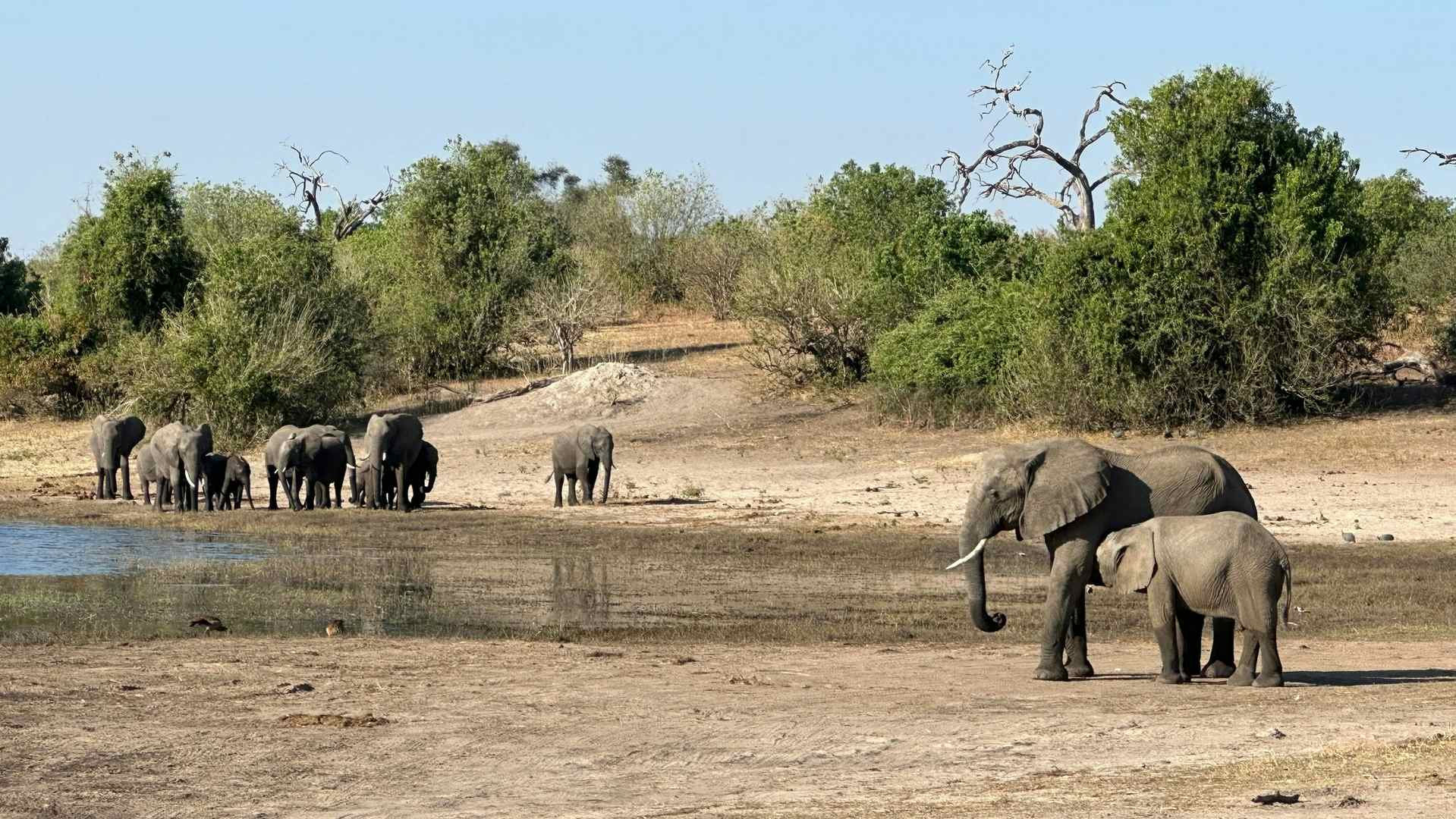
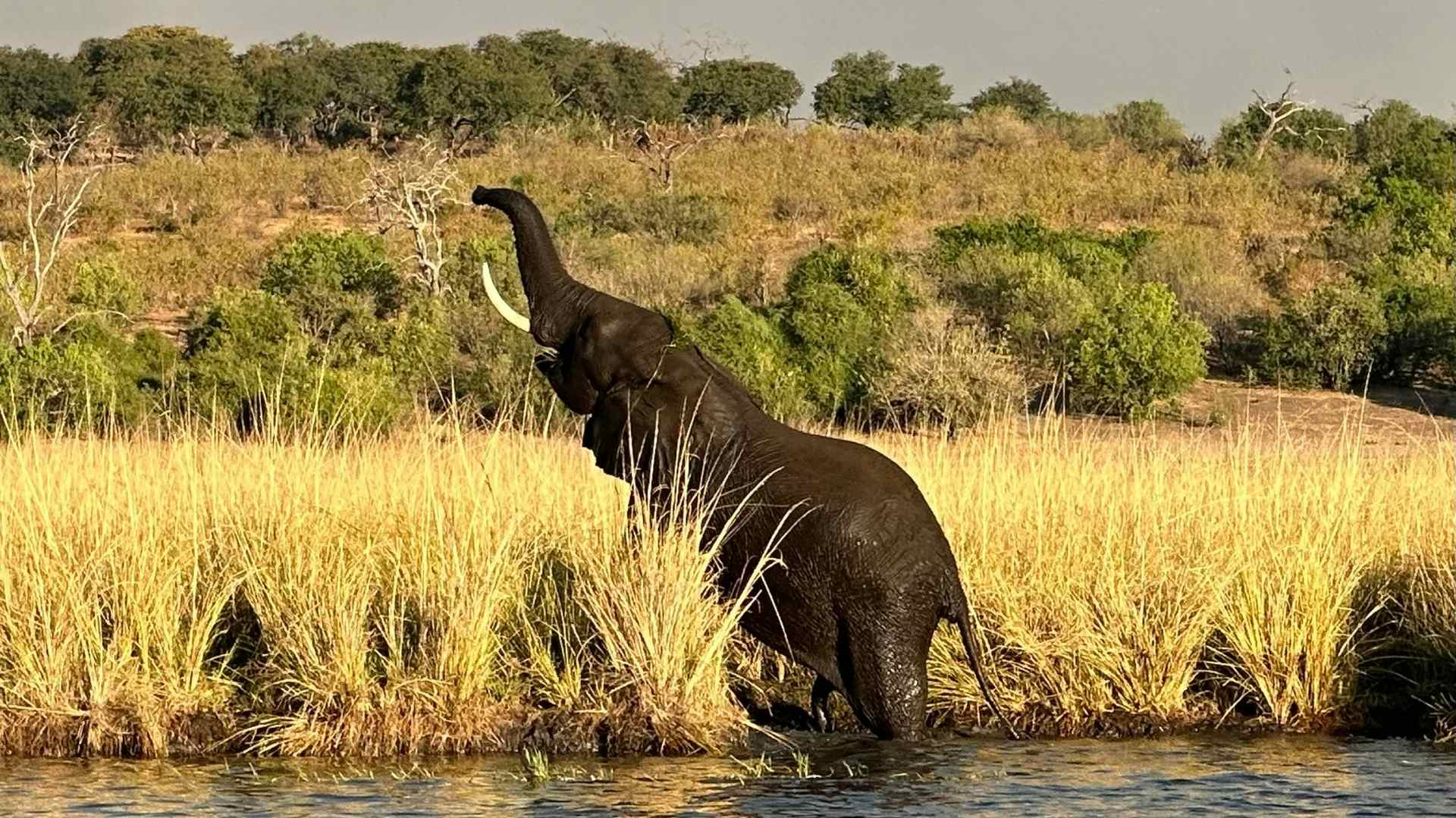
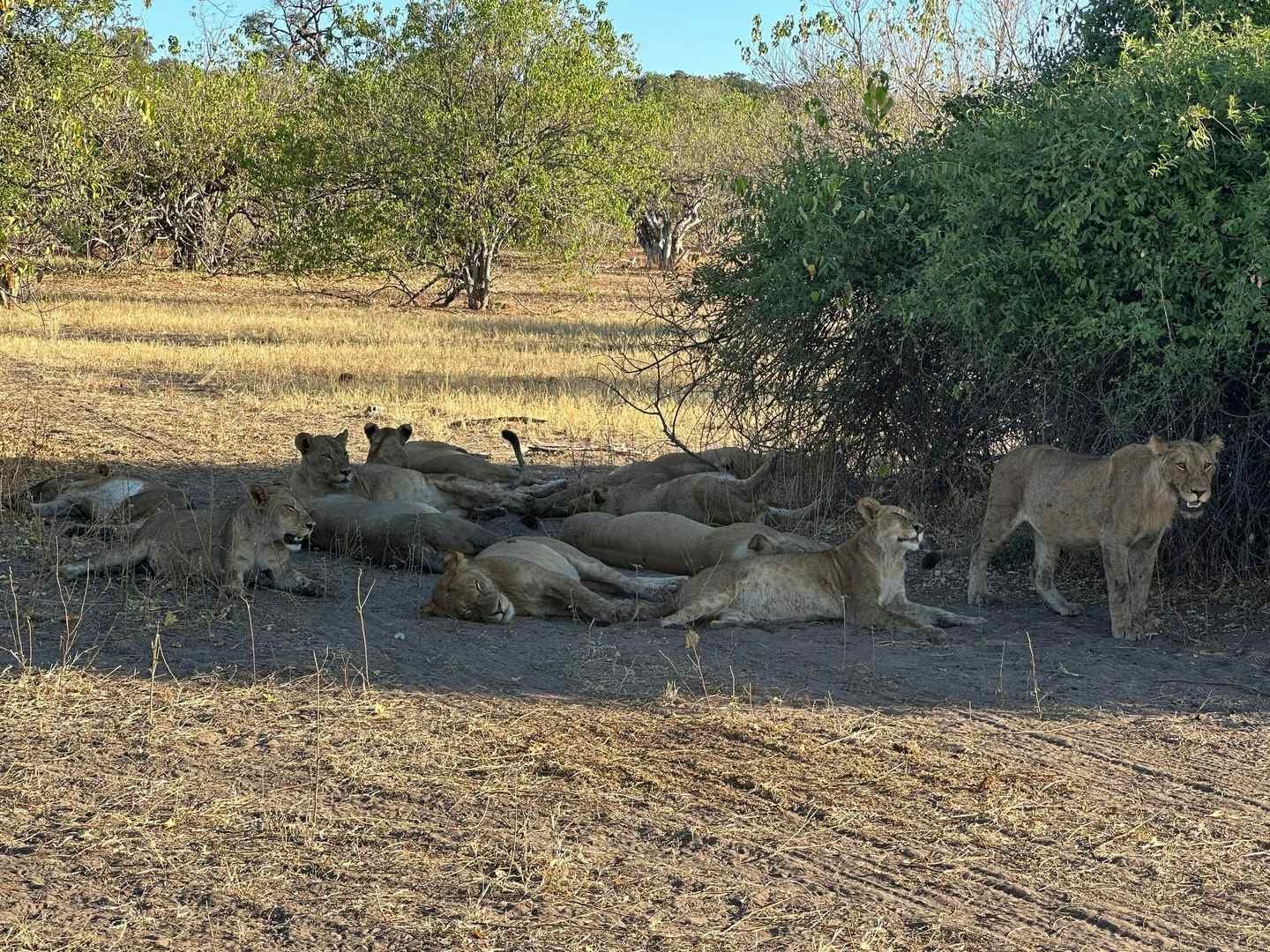
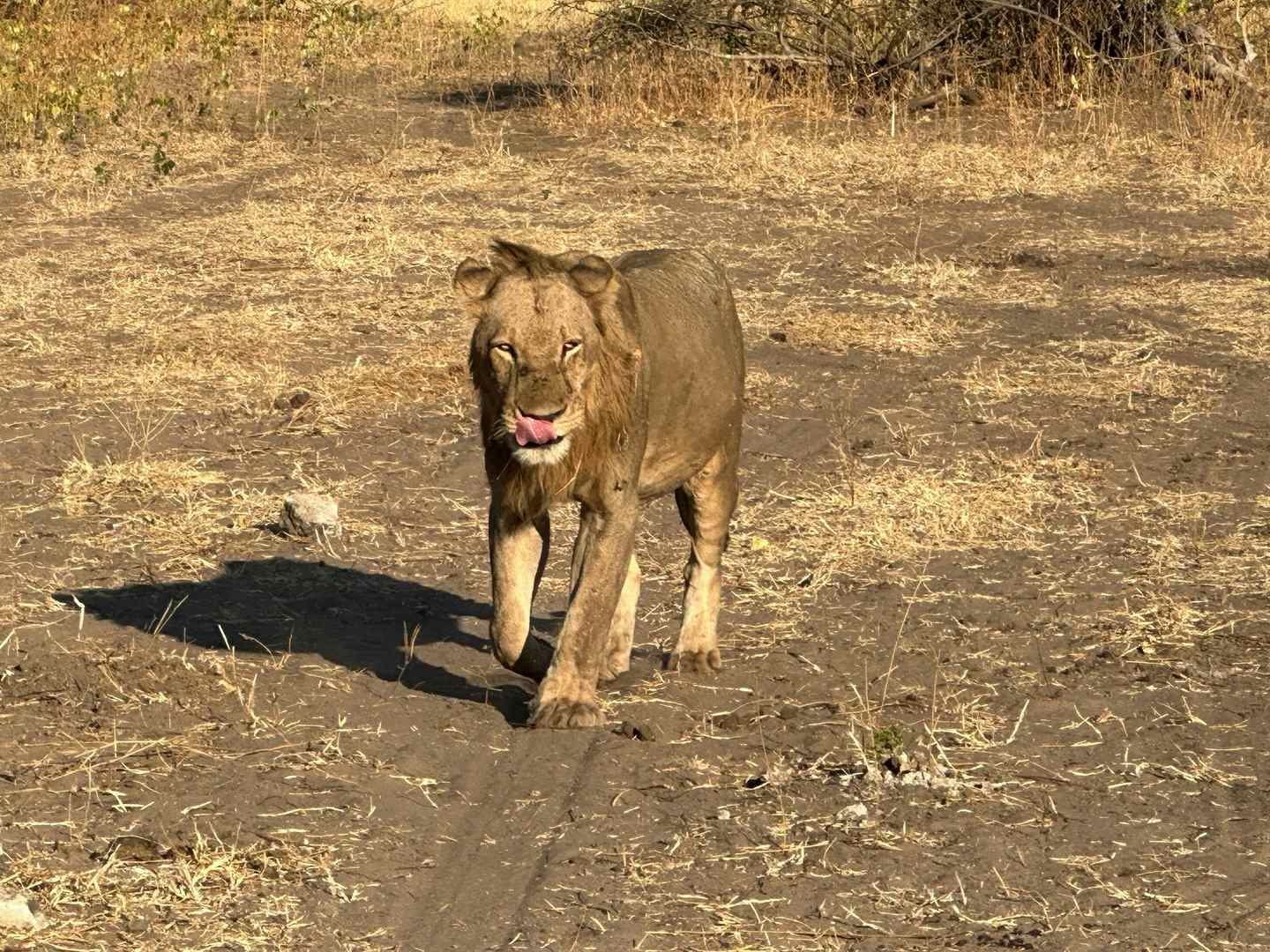
My 7th MBA trip and they just get better and better. This was an incredible trip and a truly memorable experience that will be hard to rival. The elephants, lions, giraffes, hippos, kudus, impalas, zebras, buffalo, warthogs, mongoose, baboons, crocodiles, jackal, birds were abundant and you're totally immersed in their world, especially during the bush walk at the Delta. The Delta was a major highlight and you can't beat the experience of camping out in the wild, hearing the hippos and elephants around you, seeing the stars / Milky Way above, eating great food and bonding over the campfire - never enjoyed camping so much in my life. We were well looked after by our guide Angelo from start to finish who went out of his way to ensure we had so much fun, ate very well and got the most of our whole experience in Southern Africa. The camp hosts at the Delta were really welcoming, fed us well and we had fun round the campfire. Recommend the helicopter tour. Chobe was another highlight. Vic falls was the perfect way to end such a trip. Can't rate this trip highly enough!
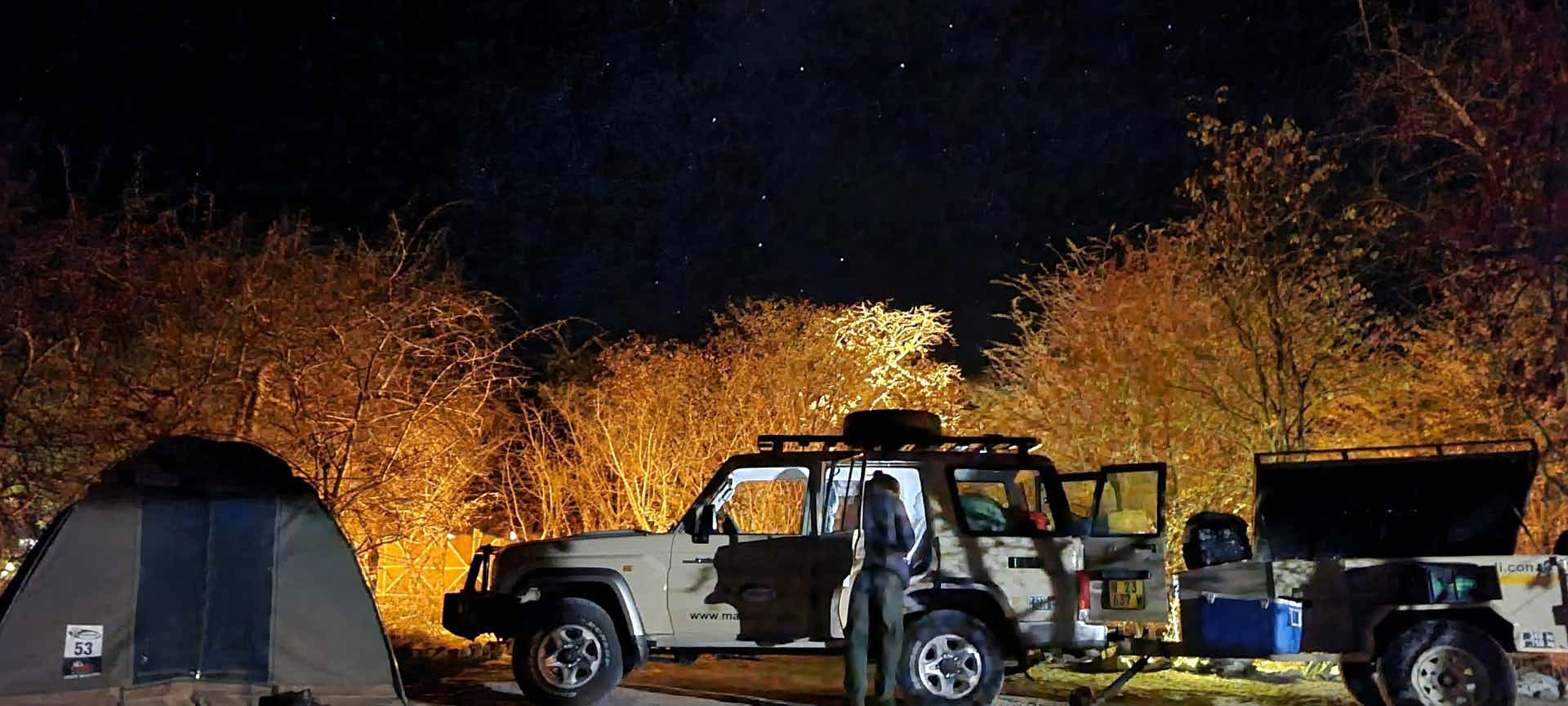
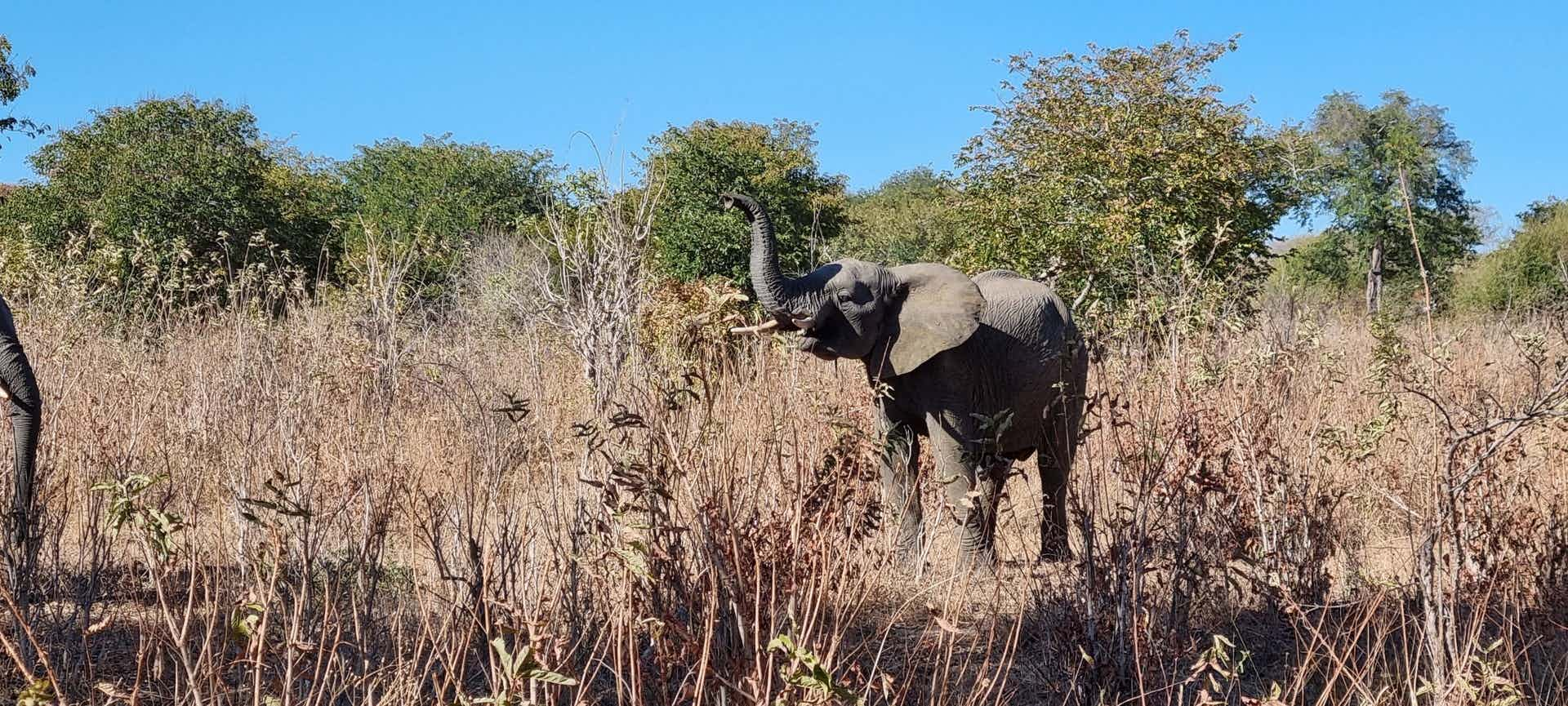
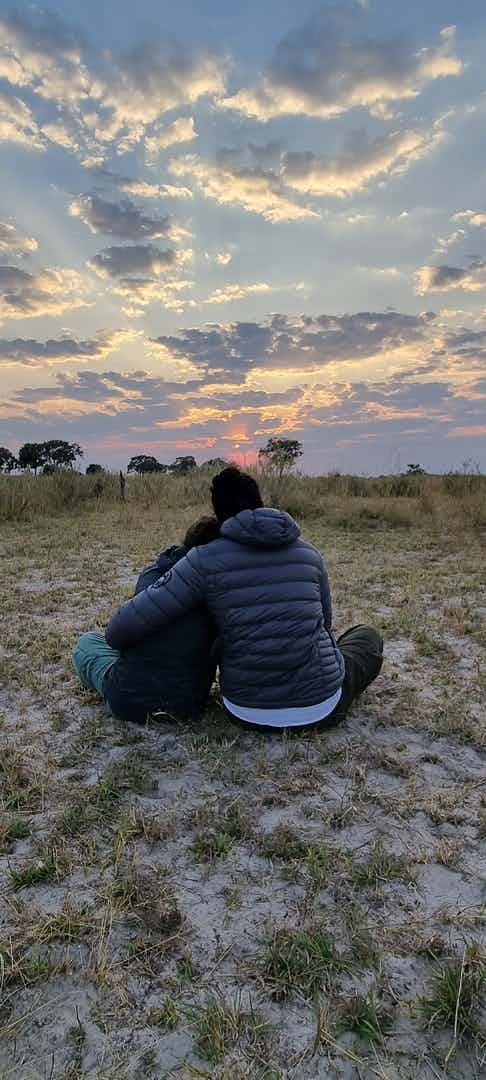
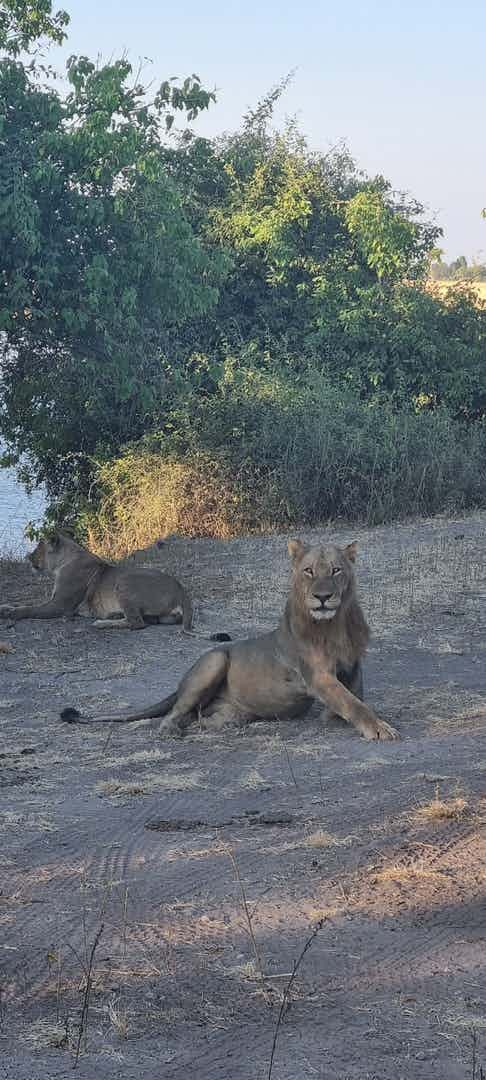
PHENOMENAL - book this now!!!!! Angelo the guide is incredible and took us on an adventure of a lifetime. The 2 nights in the delta are so special, a life changing experience for sure sleeping in tents and hearing hippos and elephants as you sleep! Food was also delicious along route - we were really well fed. One tip: don't overpack, you can do your washing at hotel(s) along way. We really can't recommend this trip enough!!!!!
Itinerary Activities
- Three mokoro journeys with your poler guide
- Two guided bushwalk safaris
- Afternoon game drive safari in Chobe National Park
- Morning game drive safari in Chobe National Park
- Sunset cruise on the Chobe River
Guides
- Local, English-speaking tour guide
- Specialist mokoro poler and bushwalking guide in the Okavango Delta
- Safari guide and driver in Chobe National Park
Accommodation
- 4 nights in hotels or lodges
- 3 nights in campgrounds
- 2 nights at a private wilderness camp
Meals
- All (9) breakfasts
- 2 freshly made lunches
- 5 hearty dinners
Transfers
- Group arrival transfer from Maun Airport at 15:00 on Day 1
- Departure transfer to Victoria Falls Airport (Zimbabwe) on Day 10
- All overland transfers during the trip
Equipment
- Tents and sleeping mats for camping
Permits
- National park entry fees in Botswana are included
Our trips are hassle-free by design. We include all the activities and equipment, as well as many of the meals, so you can simply rock up with your rucksack and share the adventure with your new pals.
Travel to and from the trip
Our trips do not include flights, trains or other travel to the start point and back from the end point.
Tips
Tips are not included in the trip cost. These are entirely at your discretion but there is an expectation to tip for good service. Your local guide will help with advice, however, we would suggest $5-$10 USD per person, per day as a guideline. Of course, you are free to tip more or less, and the amount should be reflective of your perception of service and quality – a tip is not compulsory and should only be given when you receive excellent service.
Typically, people will tip the San Bushman guide, the Mokoro polers in the Okavango Delta, and the safari guides on the game drives and boat rides, as thanks for sharing their local knowledge and experience with the group.
Additional costs
There is a local payment of $50 USD per person to be paid for the National Park entry fee at Victoria Falls.
Your visa for Zimbabwe can be paid for in cash locally at the border crossing from Botswana into Zimbabwe (approx $55USD). Please check your passport's visa and entry requirements for all countries before you travel.
Please also read the Food & Accommodation section regarding budgeting for any lunches and dinners that are not included in the itinerary.
Travel insurance
Travel insurance is compulsory for all of our adventures and you are required to provide your policy information before departing. Your insurance should include adequate protection for overseas medical treatment, evacuation/repatriation, your baggage and equipment and the specific activities involved on your adventure. We also strongly recommend it includes cancellation and curtailment insurance, should you be unable to join your trip for specific reasons such as illness. Our recommended travel insurance provider is Campbell Irvine, as their insurance offers all of the above.
Visas
Visa requirements often change, and you are responsible for obtaining any required visas for this trip. Please check with your nearest embassy or consulate for up-to-date advice.
Personal Expenses
You know your own spending habits best, so please budget an appropriate amount for things like optional meals and drinks, shopping, optional activities, and laundry.
What's included?
- Twin-share expedition tents
- Sleeping mat
What's available to hire?
- Sleeping bag and pillow if you don't bring your own (see Optional Extras)
What do I need to bring?
BAGS
- Soft overnight duffel bag or rucksack
- Daypack (20-30 litres)
- Waterproof cover/liner for daypack
SLEEPING
- Lightweight sleeping bag, 2/3 season
- Lightweight packdown/inflatable camping pillow
- Sleeping bag liner & pillow case (optional)
CLOTHES
- Light waterproof jacket
- Light waterproof trousers
- Fleece jacket or similar for evenings
- Buff or neckscarf
- Sunhat
- Lightweight trousers/shorts/skirts
- T-shirts
- Underwear and socks
- Swimwear
- Sunglasses
- Something to sleep in (layers are useful, as it can get quite chilly at night in the desert)
- Woolly hat
- Hiking boots or hiking shoes/trainers (worn-in)
- Sandals
OTHER
- Binoculars
- Universal travel plug adapter
- Power bank or solar charger
- Passports (and visas)
- Travel insurance documents
- Ear plugs
- Insect repellent
- Suncream
- Personal first-aid kit (inc. blister treatment)
- Personal items (biodegradable toiletries, sanitary wear etc)
- Quick-dry towel
- Alcohol hand-gel
- Headtorch or torch
- Reusable water bottle (1 litre)
- Biodegradable wet-wipes
- Energy bars and snacks - read our article on Best Hiking Snacks
Sleeping bag and pillow
Payable Before Departure
Sleeping bag and pillow
… Per person
Single Room - Maun (Sedia Riverside Hotel or Cresta Riley's Hotel)
Payable Before Departure
Single Room - Maun (Sedia Riverside Hotel or Cresta Riley's Hotel)
… Per night
Twin/Double Room - Maun (Sedia Riverside Hotel or Cresta Riley's Hotel)
Payable Before Departure
Twin/Double Room - Maun (Sedia Riverside Hotel or Cresta Riley's Hotel)
… Per night
Single Room - Victoria Falls (Shearwater Village)
Payable Before Departure
Single Room - Victoria Falls (Shearwater Village)
… Per night
Twin/Double Room - Victoria Falls (Shearwater Village)
Payable Before Departure
Twin/Double Room - Victoria Falls (Shearwater Village)
… Per night
Optional Private Room and Tent Upgrade
Payable Before Departure
Optional Private Room and Tent Upgrade
…
Optional private room & tent upgrade
Payable Before Departure
Optional private room & tent upgrade
… Per person
Private Airport Transfer
Payable Before Departure
Private Airport Transfer
…
We partner with the World Land Trust to ensure this trip achieves Net-Zero emissions. We also support their Buy an Acre programme, helping local communities to buy and protect natural habitats in perpetuity.
What's the number?
It works out on average at 179kg of CO2 emissions per person, including all local transport, accommodation, food, activities, guides, staff and office operations.
The only thing it doesn’t include right now is flights and travel to the destination. We do make an overall estimate across all our customers separately, but as we don’t book flights, have customers from all corners of the world, and no way of reliably knowing their travel plans, we simply can’t include an individual number in the figure on display here. We’ve got a goal to fix that, so that when you book, there is a way to measure and mitigate the carbon emitted by your flight too.
But what does the number mean?
Yep, hard to picture eh? To give you an idea:
- Driving 1000 miles/1609km would be approximately 281kg of CO2 in an average car (or 140.5kg per person, if there were two of you in it).
- A return economy class flight between London and New York would be approximately 1619kg (1.66 tonnes) per person.
- 10 trees in a temperate forest are estimated to remove approximately 250kg of CO2 from the air in a period of 5-10 years.
What are we doing about it?
Our trips are relatively low-carbon by design, and we're working with all our hosts to develop long term carbon reduction plans. We partner with the World Land Trust to ensure this trip achieves Net-Zero emissions. We also support their Buy an Acre programme, helping local communities to buy and protect natural habitats in perpetuity, ensuring the protection of the reserve and its wildlife.
Want to know more?
Amazingly, no international travel company has ever publicly published their carbon measurements before, as far as we know. We believe that must change, quickly. So we’re openly sharing the method we used in the hope that other companies will be able to more easily follow suit and build on what we've done so far. You'll find it all here.
Botswana’s tourism model has been a huge success in managing its vast wild spaces and huge populations of free roaming wildlife. The number of visitors are restricted and the national parks and wildlife reserves – which cover a fifth of Botswana’s landmass – omit any fences or physical borders, so safaris here are a true experience of the wilderness. Government policy is focused on low-impact, high-value tourism; so while prices are often quite high compared to other parts of Africa, the income is critical to ongoing conservation efforts and local community empowerment. The tourism model is based around a ‘concession’, where safari companies compete for leases to operate in the reserves, and must prove their commitment to environmental management and financial responsibility towards local communities in order to renew their leases. Large percentages of revenue are reinvested in communities and towards conservation programs, with rigorous rules in place, including laws protecting the employment of Botswanan citizens rather than outsourcing to other countries. Over 10% of the population of Botswana is employed in the tourism sector, ensuring sustainable livelihoods for whole communities and a huge number of people.
In addition to the concession model and the positive benefits tourism brings to local communities, visiting Botswana can also massively help efforts to block hunting in the country. In 2019, Botswana lifted a five-year hunting ban, to the dismay of conservationists in Botswana and around the world. Simply put, the greater the income from Botswana’s famed and highly regarded tourism industry, the greater the pressure on the government to reinstate the ban in the near future.
Finally, this trip visits some key areas of the Kavango-Zambezi Transfrontier Conservation Area (KAZA), where the borders of five African countries converge. The sheer scale of this vast international conservation project is difficult to comprehend and it encompasses a bewildering range of experiences, ranging from the mighty Victoria Falls to the lifeforce of the region, the Zambezi and Chobe Rivers.
This is an incredible trip for wildlife lovers! In particular you will be visiting two of the great natural areas of Africa, the Okavango Delta and Chobe National Park. The Okavango is one of the largest wetlands on the continent, making it a paradise to hundreds of species of birds such as cranes, storks, jacana, kingfishers and many more. As a vast oasis north of the Kalahari, it is also home to much larger animals such as elephants, rhinos, lions, zebras, hippos and crocodiles. In Chobe NP you'll have further opportunities to see Africa's 'Big 5', amongst the abundant wildlife present such as buffalo, wildebeest, hyena, cheetah and antelope.
When on safari game drives and boat rides you'll have expert guides to help you spot the wildlife and educate you on the environment they live in. In the Okavango Delta, you'll be piloted in mokoro canoes through the wetlands by local guides called 'polers' and wild camping on an island deep in the delta for a fully immersive experience. Remember, as a visitor into a natural environment with wild animals, you must follow your guide's instructions at all times for safety reasons.
Yes, there is a local payment of $50 USD per person to be paid to your guide towards the end of the trip, for the National Park entry fee at Victoria Falls.
Your visa for Zimbabwe can be paid for in cash locally at the border crossing from Botswana into Zimbabwe (approx $55USD). Please check your passport's visa and entry requirements for all countries before you travel.
Your border fees between Namibia and Botswana and all your national park fees in Botswana are covered in the main trip price. Please also read the Food & Accommodation section regarding budgeting for any lunches and dinners that are not included in the itinerary.
Botswana's Pula can be purchased on arrival, or withdrawn from local ATMs. In Botswana, many local purchases can be made by card. The commonly used currency in Zimbabwe is the US Dollar; it is recommended that you bring some USD in cash. Some activities and items can also be paid for on a card.
As a general rule: plan ahead before you travel, to avoid paying unnecessary currency charges and fees.
Your host will provide you with clean, safe drinking water from large containers, while the lodges, hotels and campgrounds will also supply safe drinking water during your stays. Bring a refillable bottle, it will be used well.
No. You'll need to have a larger bag suitable for all your belongings which will be transported for you, and then a small daysack to carry personal items during each day of hiking.
As this trip starts in Maun and ends 1500km away at Victoria Falls, you'll need to bring everything along with you. Your overland expedition vehicle has ample storage and your main luggage can be safely stored in there throughout the trip.
This trip operates in areas where daytime temperatures can reach extreme highs, where limited shade and high humidity can also be a factor. These conditions can affect physical performance and increase the risk of dehydration or heat-related illness. Your guide will adjust the pace and monitor the group closely, but hydration, proper clothing, and sun protection are essential.
Before travelling, consider your ability to be active in high temperatures and consult a medical professional if you have concerns, especially if you have any cardiovascular or heat-sensitive conditions. Arriving a day or two prior to the trip may help you adjust gradually to the heat.
Sure can! Over 70% of our travellers travel solo, it’s a great way to meet like-minded people.
Our team of Adventure Hunters co-create exclusive adventures which are run by highly vetted, specialist hosts. The trip is run by our trusted host partner in the destination. We only work with independent, local, in-destination experts who know the very best places to explore and how to stay safe. Read more information about the local teams we partner with. You’ll be introduced to the host straight after making a booking via the Much Better Adventures platform.
Much Better Adventures refer to the UK Government’s official travel advice when designing trips and monitoring trip operations. We recommend that all customers are familiar with the practical information provided on the Government’s FCDO website, where current travel advice can be found by searching for the applicable destination(s).
For customers joining this trip from other international destinations – please also read the official travel advice applicable to your country of residence/origin, as this may differ.
We recommend checking out the country-specific information and also talking to a travel nurse.
We automatically convert prices from the local currency that a host receives to your chosen currency. We update our exchange rates on a daily basis so this does mean that prices displayed on the site are subject to currency fluctuations, which is why you may see them change over time.
If you wish to change the currency you pay in, head to the bottom of the page.
All of our group adventures are specially designed for adults to enjoy as we want these adventures to bring together outdoorsy people who are truly like-minded. You must be over 18 to join one of our trips.
You're always in good company on one of our adventures.
Our trips are typically made up of a mixture of solo travellers and small groups of 2 or 3 friends, with most in their 30s-50s.
Our sociable adventures are solo-friendly by design and naturally attract outdoorsy people with a shared mindset; a love for adventure, a desire to push themselves and meet awesome, like-minded people along the way.
It’s this camaraderie that has so often turned a great adventure into a life-changing one.
Don't just take our word for it:
- 95% of people rate the group dynamics on our trips 5/5
- 90% of people recommend joining a trip to make new friends
- 75% of people have met people on our trips that they would now consider friends
See here for more info about the Much Better Adventures tribe.
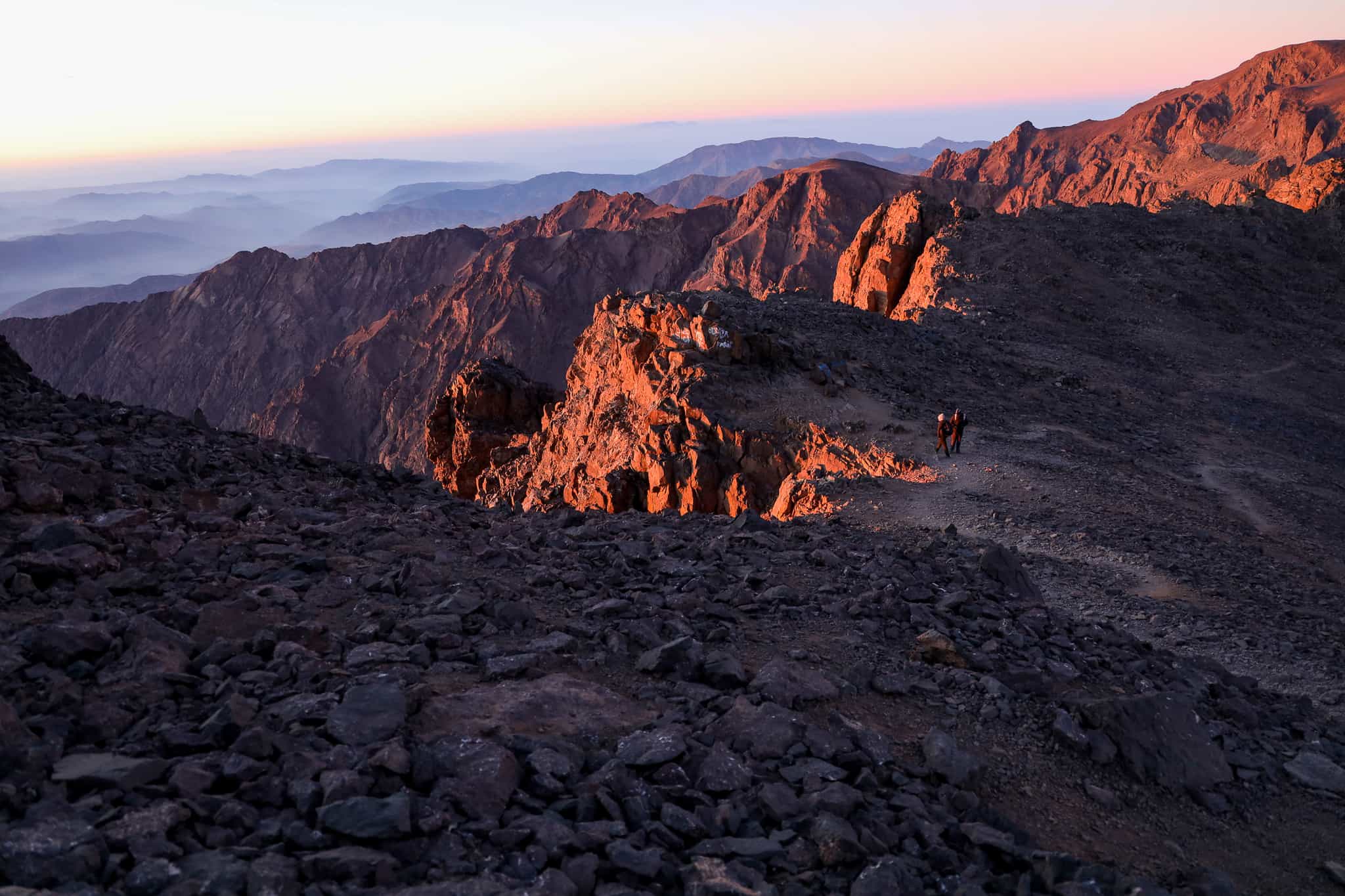
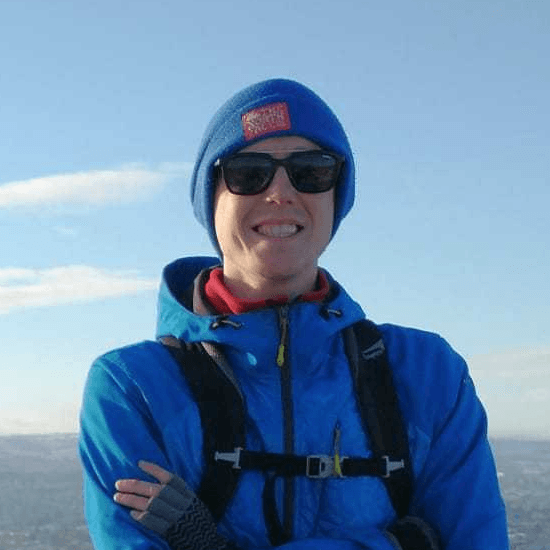
Need help finding flights?
From logistics and how to get there, to fitness, group dynamic and trip difficulty, Rory and his team of friendly experts are on hand to help.
We've got your back
Guaranteed to run
All Much Better Adventures trips are now guaranteed to run. Once you’ve booked your spot you can immediately make your travel arrangements, no uncertainty, no hanging about (excludes 'request to book' departures). Full details
Flexible payments
Secure your spot with the minimum deposit and pay off the remaining balance in as many instalments as you like, with no interest or fees. Full details
Happiness Guarantee
We’re so confident you’ll have an amazing time we’ll put our money on it. Full details
Full financial protection
To give you complete peace of mind Much Better Adventures is backed by ABTOT, ABTA and ATOL memberships. Full details
Tried & Trusted
Much Better Adventures is rated ‘Excellent’ on Trustpilot with over 1000 verified trip reviews averaging 4.8/5.
Connect before you go
You'll be invited to join a WhatsApp group to get to know each other before your big adventure together. Full details
DEPARTURE DATES
Friday 29th August 2025
to Sunday 7th September 2025
Early Bird Botswana Special Offer
